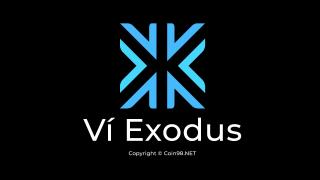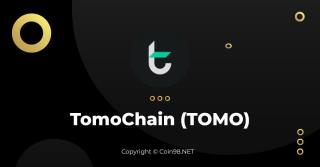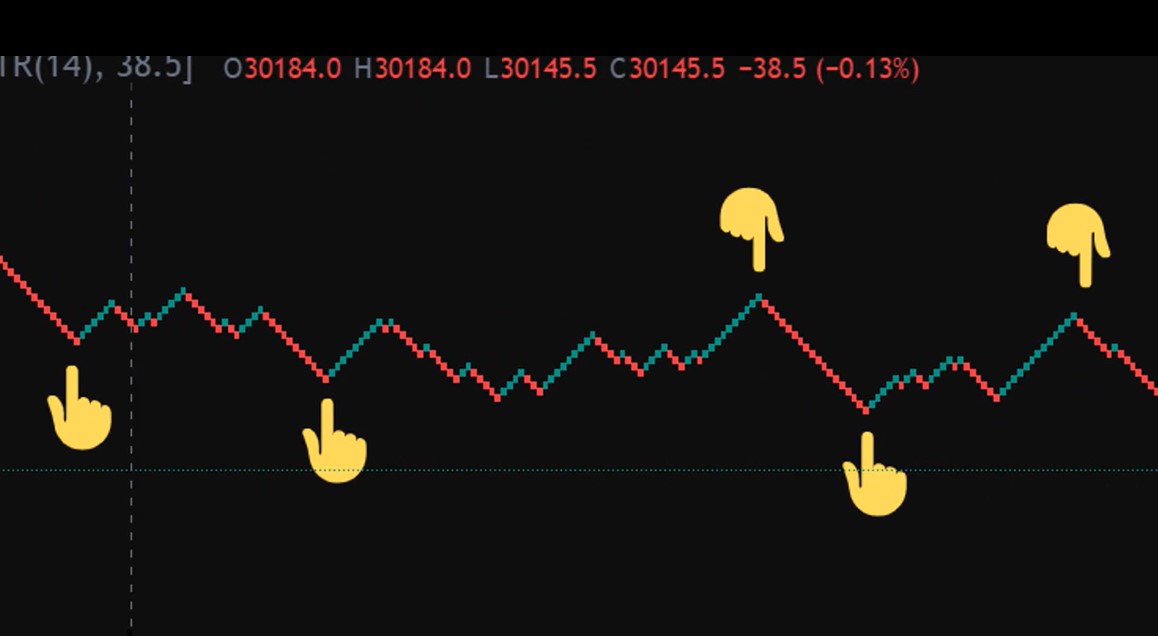FTX è uno scambio centralizzato di criptovalute che offre varie applicazioni e servizi come derivati, opzioni, prodotti di volatilità e token con leva. Impariamo a conoscere le funzionalità di FTX e come usarle!
Cos'è FTX?
FTX è uno scambio centralizzato di criptovalute che offre varie applicazioni e servizi come derivati, opzioni, prodotti di volatilità e token con leva. Nel luglio 2021, FTX ha raccolto 900 milioni di dollari con una valutazione di 18 miliardi di dollari da oltre 60 investitori. Questo è il più grande evento di raccolta fondi mai registrato nella storia delle criptovalute.
Al momento, FTX è tra i primi 3 scambi centralizzati di criptovaluta, classificati da CoinMarketCap (Fonte: qui ).
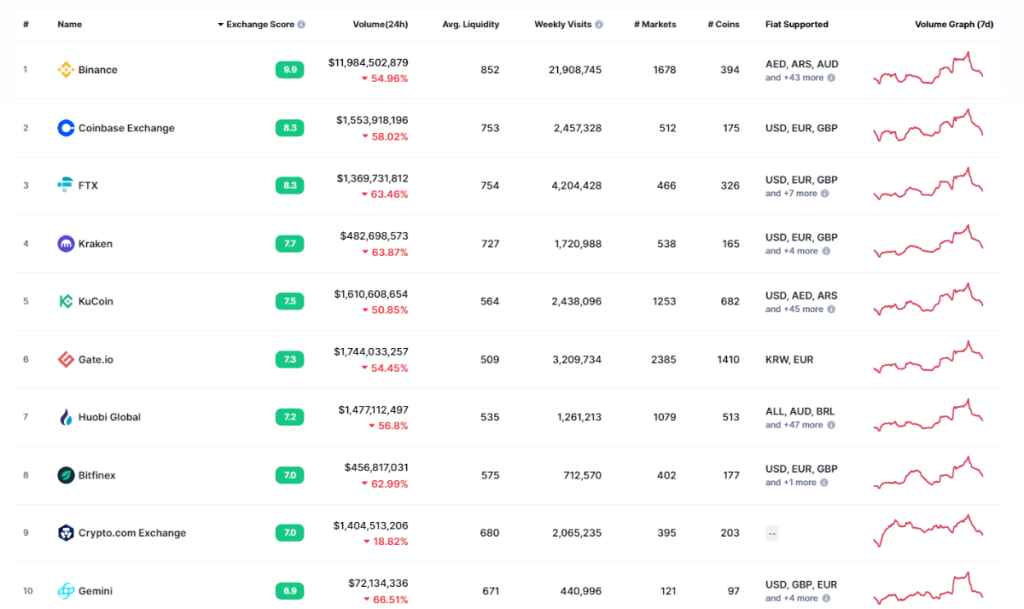
Chi ha creato FTX?
Sam Bankman-Fried (SBF) e Gary Wang, due laureati del MIT, hanno fondato FTX nel maggio 2019. In precedenza, Sam Bankman-Fried era un trader internazionale presso Jane Street Capital e possedeva una società di trading quantitativo chiamata Alameda Research .

La timeline ò Sam Bankman-Fried
A cosa serve FTX? Perché usare FTX?
Come accennato in precedenza, FTX è uno scambio di criptovaluta. Ciò significa che le persone possono utilizzare FTX per acquistare e vendere a proprio agio risorse crittografiche, insieme a numerosi altri componenti aggiuntivi.
Ci sono varie funzionalità per le quali dovresti usare FTX oltre al tradizionale trading spot, come ad esempio:
- Trading con margine FTX, futures, token di leva e opzioni.
- Mercato FTX NFT.
- Supporta cittadini statunitensi e non statunitensi.
- Carta FTX (debito).
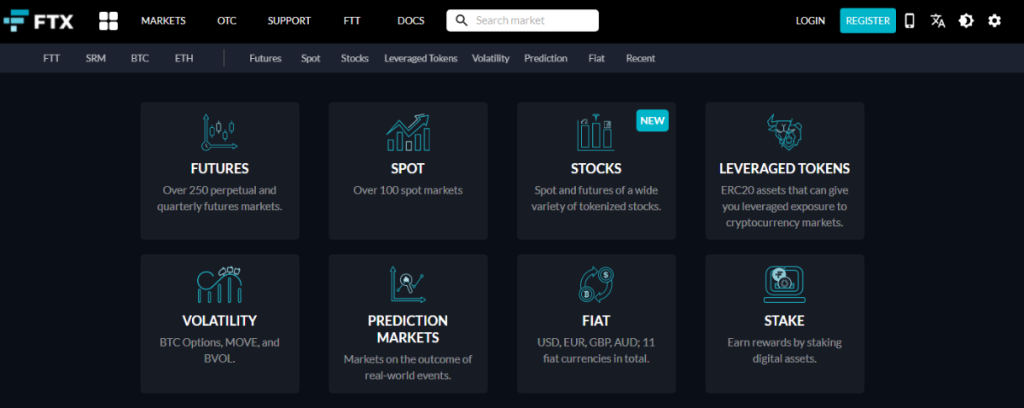
Funzionalità FTX
Come funziona FTX?
Come scambio di criptovaluta, FTX funziona in modo simile a qualsiasi altro CEX. Il volano di FTX può essere visto come:
Passaggio 1: FTX è stato rilasciato con alcuni mercati e asset iniziali.
Passaggio 2: FTX ha incentivato gli utenti a fare trading sulle loro piattaforme. Questo può essere fatto in diversi modi (Pubblicità, Marketing, Programma di incentivazione,...).
Passaggio 3: FTX guadagna più utenti e volume di scambi.
Passaggio 4: di conseguenza, FTX riceve maggiori entrate.
Passaggio 5: FTX aumenta di valore e continua ad attrarre più utenti e volume di scambi introducendo più mercati e asset.
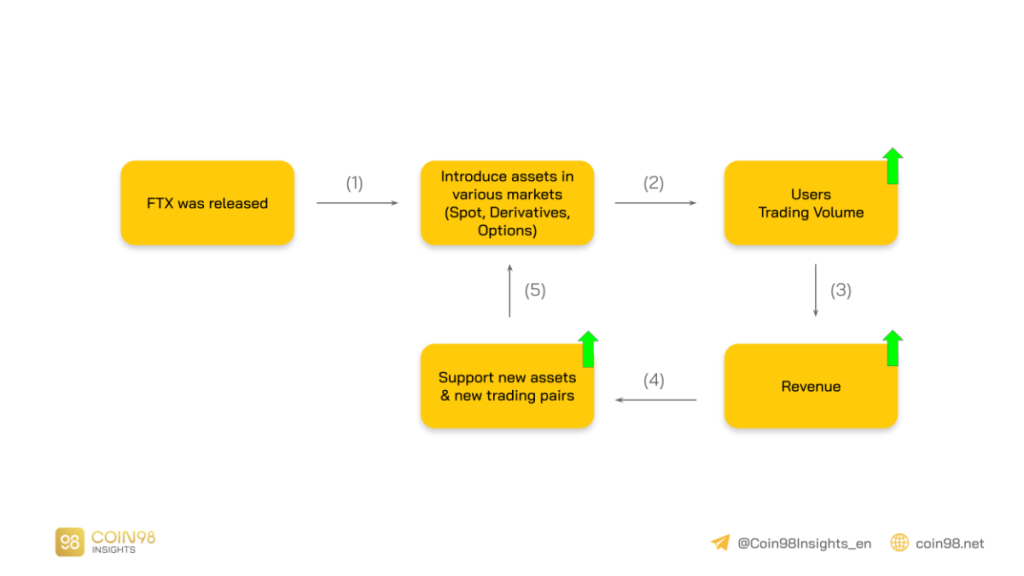
Revisione dello scambio FTX (2022)
Anche se FTX è ed è stato uno dei migliori CEX nel mercato delle criptovalute al momento, ha ancora pro e contro. Ecco alcune valutazioni imparziali di FTX:
Vantaggi di FTX
- Supporta oltre 300 criptovalute.
- Commissioni di trading basse con programmi di sconto.
- 0 commissioni di deposito e prelievo per una varietà di token (stablecoin USD + token SPL).
- Favorisci i possessori di FTT (il token nativo di FTX) offrendo numerosi vantaggi.
- Tipi di mercato versatili, inclusa la leva fino a 100x.
- Avere un mercato NFT.
- Sviluppa applicazioni sia su desktop che su dispositivi mobili.
Svantaggi di FTX
- Forse ostile per i nuovi utenti di crittografia in quanto hanno un'interfaccia professionale con molte funzionalità complicate.
- Nessun supporto per la chat dal vivo.
FTX vs. FTX USA: qual è la differenza?
FTX ha numerose versioni come FTX US (Stati Uniti) o FTX TR (Turchia). Ciò è dovuto alla complicazione della regolamentazione che rende FTX incapace di operare in alcuni paesi. Questo caso è estremamente popolare in paesi come gli Stati Uniti
Per affrontare questo problema, i CEX di solito hanno diverse versioni per i diversi paesi per adattarsi alle loro regole e leggi. Ad esempio, Binance ha anche Binance.US e Binance TR, simili a FTX.
Prodotti chiave di FTX Exchange
In questa parte, esaminerò alcune delle caratteristiche più straordinarie di FTX e ti spiegherò come funziona.
Spot trading
Lo spot trading è la funzione più basilare che ogni borsa deve avere. È semplicemente l'acquisto e la vendita diretti di valute diverse, come BTC o ETH.
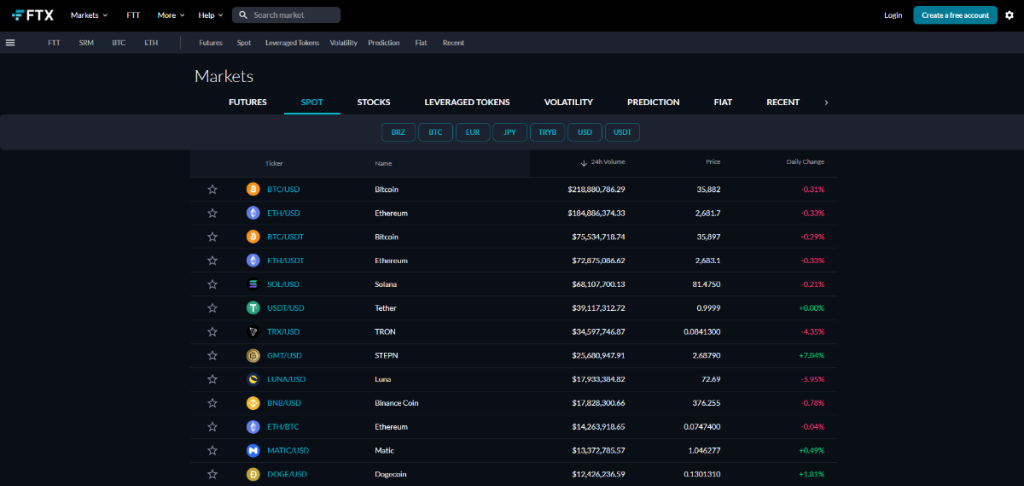
Trading a margine
Il trading con margine è molto simile allo spot trading. L'unica differenza è che il trading con margine ti consente di prendere in prestito più capitale per sfruttare la tua posizione mentre lo spot trading no.
Quando prendi in prestito fondi in Margin Trading, tieni presente che sarai esposto ai rischi di liquidazione. Tutti i tuoi fondi (inclusi i fondi originali) andranno persi se l'attività presa in prestito scende di prezzo oltre una certa soglia.
Quando chiudi il tuo ordine di Margin Trading, devi rimborsare una percentuale dell'importo preso in prestito come interessi. Questa tariffa dipende dalla piattaforma e dall'asset. Più a lungo prendi in prestito, più dovrai rimborsare.
Il trading con margine condivide lo stesso mercato del trading spot (mercato spot). Ciò significa che un asset in Margin Trading avrà sempre lo stesso prezzo di quell'asset in Spot Trading.
Trading di futures
I futures sono un tipo di prodotto di trading di derivati. Il trading di futures non coinvolge token o criptovalute, ma piuttosto contratti che detengono il valore dell'asset sottostante. In quanto tali, gli utenti scambiano contratti in Futures Trading, non direttamente i token stessi.
Questi contratti implicano un accordo tra due parti per l'acquisto (Long) o la vendita (Short) di un'attività sottostante a un prezzo fisso in una determinata data. Gli investitori aprono una posizione lunga se si aspettano che il prezzo dell'attività sottostante salga e una posizione corta se si aspettano che il suo prezzo scenda. Il trading di futures di solito va di pari passo con la leva finanziaria.
Ad esempio: il prezzo di BTC è di $ 40.000. Bob apre una posizione lunga su BTC mentre Alice apre una posizione corta, entrambi con leva 10x. Ora il prezzo di BTC diventa $ 44.000 (+10%). Se entrambi decidono di uscire dalle loro posizioni in questo momento, Bob guadagnerà il 100% (10*10%) mentre Alice verrà liquidata poiché la sua posizione è in calo del 100%.
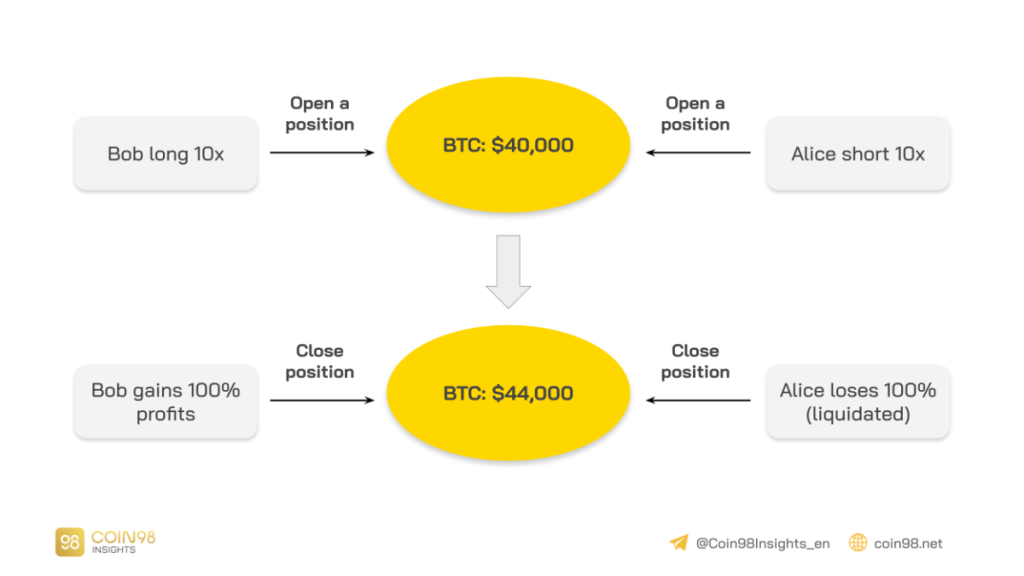
Un esempio di come funziona il Trading di Futures
I contratti future di solito hanno una data di scadenza che viene impostata al momento dell'apertura del contratto. Tuttavia, esiste un tipo di contratto Futures chiamato Perpetual che ti consente di mantenere il contratto per tutto il tempo che desideri. Per questo tipo di contratto, devi pagare un Tasso di Interesse specifico (simile al prestito nel Margin Trading).
FTX supporta un gran numero di contratti Perpetual Futures. Trattandosi di contratti e non di asset, il valore sottostante può essere molto versatile. Ad esempio, FTX abilita anche indici come ALT (Altcoin Index) o DEFI (DeFi Index) come valore sottostante di questi contratti.
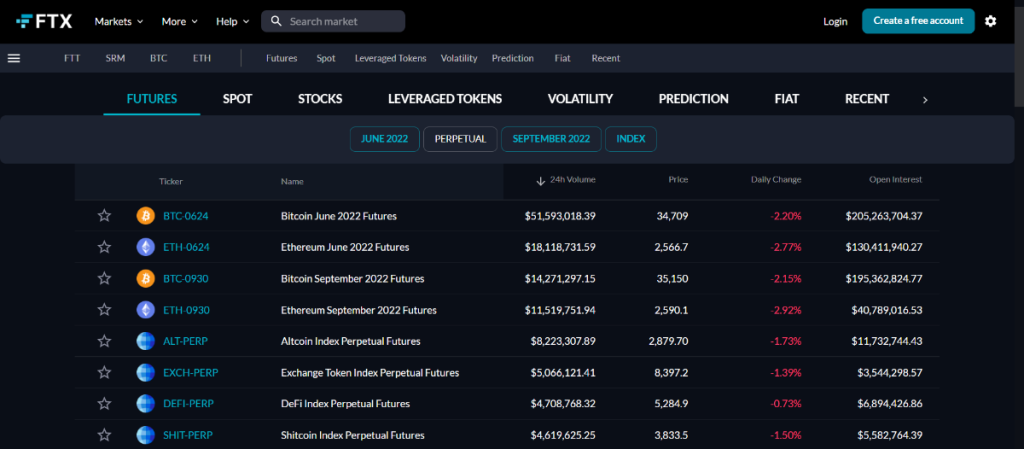
Azioni tokenizzate
FTX emette anche azioni tokenizzate come attività derivati. Sono inoltre disponibili per l'acquisto su FTX diversi titoli come TSLA (Tesla), AMZN (Amazon) o TWTR (Twitter). I loro prezzi saranno identici a quelli del mercato azionario originale.
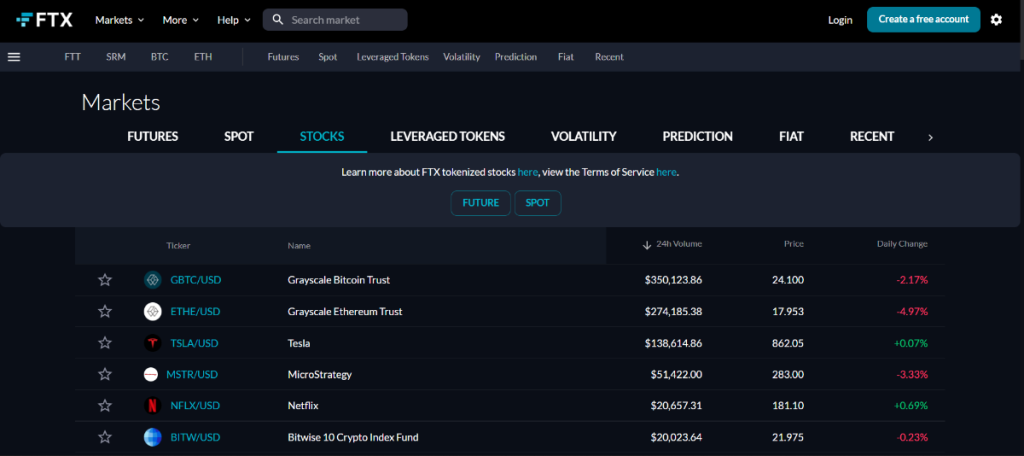
Token con leva
I Leveraged Token sono asset ERC-20 che portano il valore intrinseco della leva finanziaria degli asset originali. I Leverage Token funzionano in modo simile ai contratti Perpetual Futures, con l'unica differenza che non impongono rischi di liquidazione agli utenti.
Ogni token Leveraged ottiene la sua azione di prezzo scambiando FTX Perpetual Futures. Ad esempio, supponiamo di voler creare $ 10.000 di ETHBULL. Per fare ciò, invii $ 10.000 e il conto ETHBULL su FTX acquista $ 30.000 di ETH Perpetual Futures. Pertanto, ETHBULL è ora 3 volte lungo ETH.
Esistono 5 tipi di token con leva su FTX:
- BULL (+3x): se l'attività sottostante aumenta dell'1% di valore, il suo token BULL aumenterà del 3% di valore.
- BEAR (-3x): se l'attività sottostante aumenta dell'1% in valore, il suo token BEAR diminuirà del 3% in valore.
- HEDGE (-1x): se l'attività sottostante aumenta dell'1% in valore, il suo token HEDGE diminuirà dell'1% in valore.
- HALF (+1/2x): se l'attività sottostante aumenta dell'1% in valore, il suo token HALF aumenterà dello 0,5%.
Quando il prezzo scende, una parte dei token BULL posseduti dagli utenti verrà venduta per mantenere la leva 3x. In questo modo, i possessori di token BULL saranno sempre esposti a una posizione lunga 3x senza essere liquidati. La stessa situazione si applica ad altri tipi di token con leva.
I token con leva sono estremamente utili per:
- Gestione dei rischi: Diversamente dai contratti Perpetual Futures, i Leveraged Token non impongono rischi di liquidazione.
- Strategie di gestione: i token con leva vengono automaticamente ribilanciati, indipendentemente dal fatto che il prezzo dell'asset originale salga o scenda. I token HEDGE, ad esempio, aumentano automaticamente la loro posizione se il prezzo dell'asset diminuisce. Ciò è vantaggioso per gli investimenti a lungo termine poiché aumentano costantemente le dimensioni della posizione.
- Convenienza: i token con leva sono in realtà risorse ERC-20, il che significa che possono essere trasferiti tra diversi portafogli pur mantenendo la loro funzionalità.
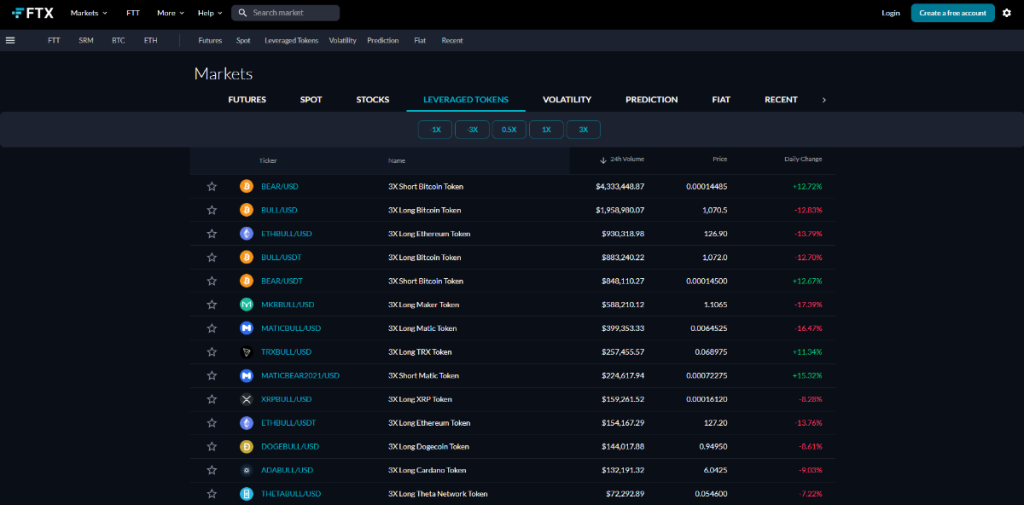
Volatilità
La funzione di volatilità su FTX è composta da 2 elementi principali: i contratti Bitcoin MOVE e i token di volatilità (inversa) di Bitcoin.
I contratti Bitcoin MOVE rappresentano il valore assoluto della variazione del prezzo di Bitcoin in un determinato periodo di tempo. Ad esempio, i contratti Bitcoin MOVE Today registrano il prezzo di Bitcoin all'inizio e alla fine della giornata. Indipendentemente dal fatto che il prezzo di Bitcoin salga o scenda in quel giorno specifico, il valore assoluto del cambiamento verrà registrato in quei contratti.
La durata dei contratti Bitcoin MOVE può essere giornaliera, settimanale o trimestrale. In un modo semplice, i contratti Bitcoin MOVE funzionano in modo abbastanza simile ai contratti Futures in quanto possono essere entrambi applicati con leva.
L'unica differenza è che i contratti MOVE prendono in considerazione il valore assoluto della variazione di prezzo, piuttosto che la sua direzione al rialzo o al ribasso. Longing contratti MOVE significa che vuoi speculare che il prezzo dell'asset oscillerà molto, mentre shorting significa che ritieni che il suo prezzo sarà relativamente stabile.
I token Bitcoin Volatility (BVOL) e Inverse Bitcoin Volatility (iBVOL) tracciano la volatilità implicita di Bitcoin utilizzando i contratti FTX MOVE e i contratti BTC-PERP. BVOL tenta di tracciare i rendimenti giornalieri di essere 1 volte lungo la volatilità implicita di BTC; iBVOL tenta di tracciare i rendimenti giornalieri di essere 1 volte corti rispetto alla volatilità implicita di BTC.
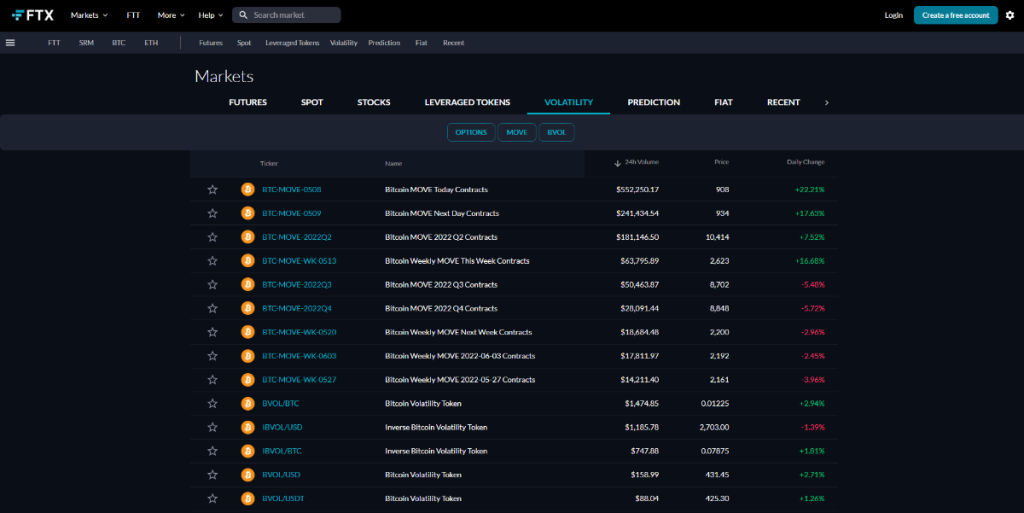
Mercato delle previsioni
FTX supporta anche la funzione Prediction, chiamata Mercato delle previsioni. Il mercato delle previsioni produce contratti Futures che offriranno 2 scelte: una condizione li porterà a $ 0, mentre l'altra li renderà $ 1. Longare questi contratti di previsione ti gioverà se la tua scelta è corretta e il contratto va a $ 1 mentre lo shorting ti gioverà se il contratto va a $ 0.
Ad esempio, TRUMP-2024 (TRUMP2024) è un contratto future su FTX che scade a $ 1 se Donald Trump vince le elezioni presidenziali statunitensi del 2024 e $ 0 in caso contrario.
- Desiderio significa che credi che Donald Trump vincerà e il valore del contratto diventerà $ 1.
- Shorting significa che ritieni che Donald Trump perderà (non vincerà) e il valore del contratto diventerà $ 0.
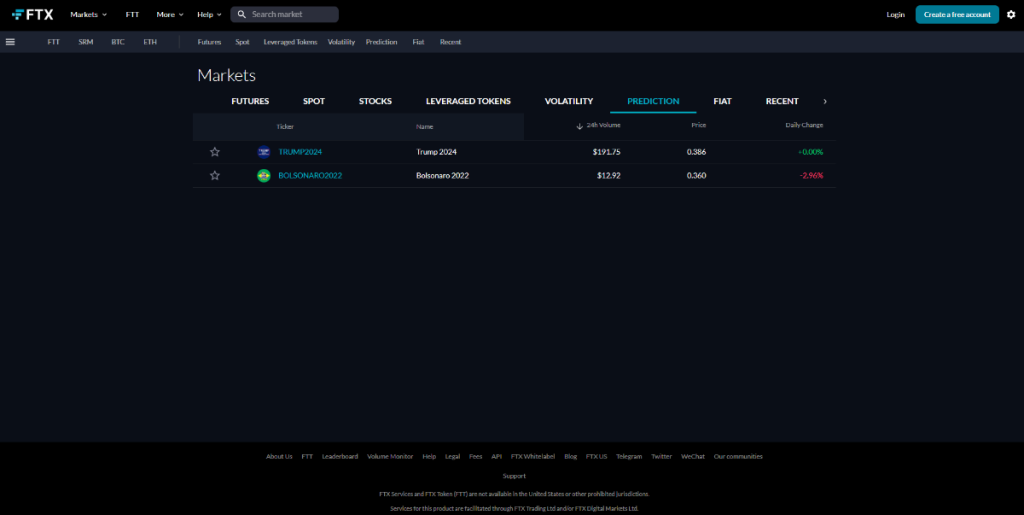
Staking FTT
Come accennato in precedenza, FTT è il token nativo di FTX. Riceverai molteplici vantaggi per il possesso di FTT, come ad esempio:
Presa:
- Fino al 60% di sconto sulle commissioni di trading FTX.
- Fino allo 0,02% di sconto FTX OTC.
- Possibilità di diventare VIP2.
- Airdrop SRM settimanali.
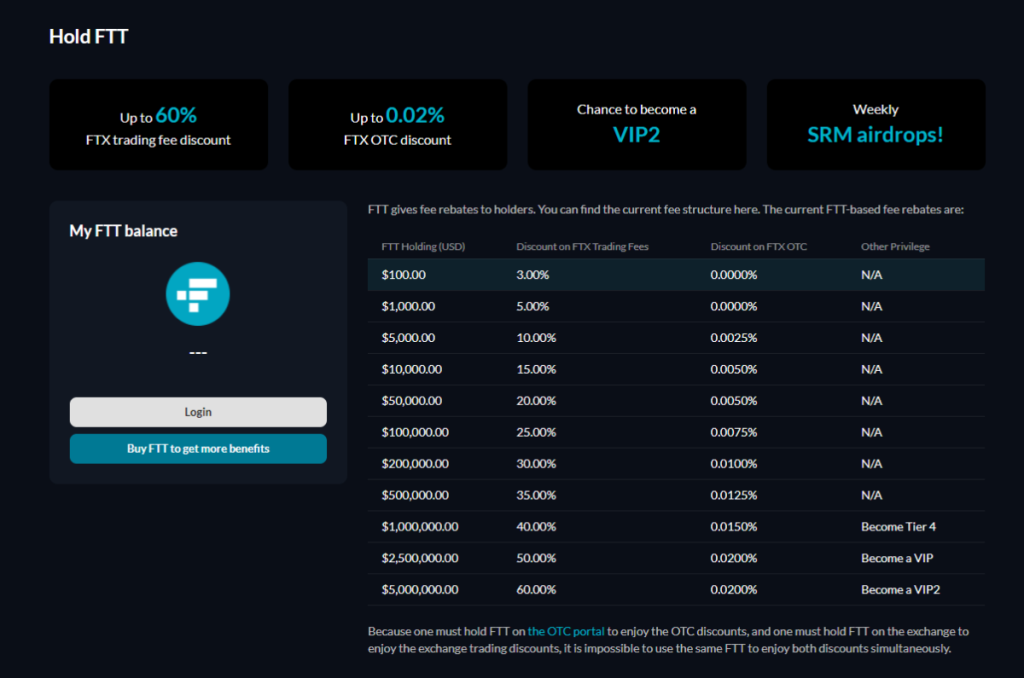
Puntata:
- Fino al 40% di tariffe di riferimento.
- Fino allo 0,003% di sconto sulla commissione del produttore.
- Fino a 50 voti bonus.
- Fino al 14% di aumento relativo di Airdrop.
- Fino a 1.000 prelievi giornalieri gratuiti ERC20/ETH.
- Fino a 6 biglietti IEO.
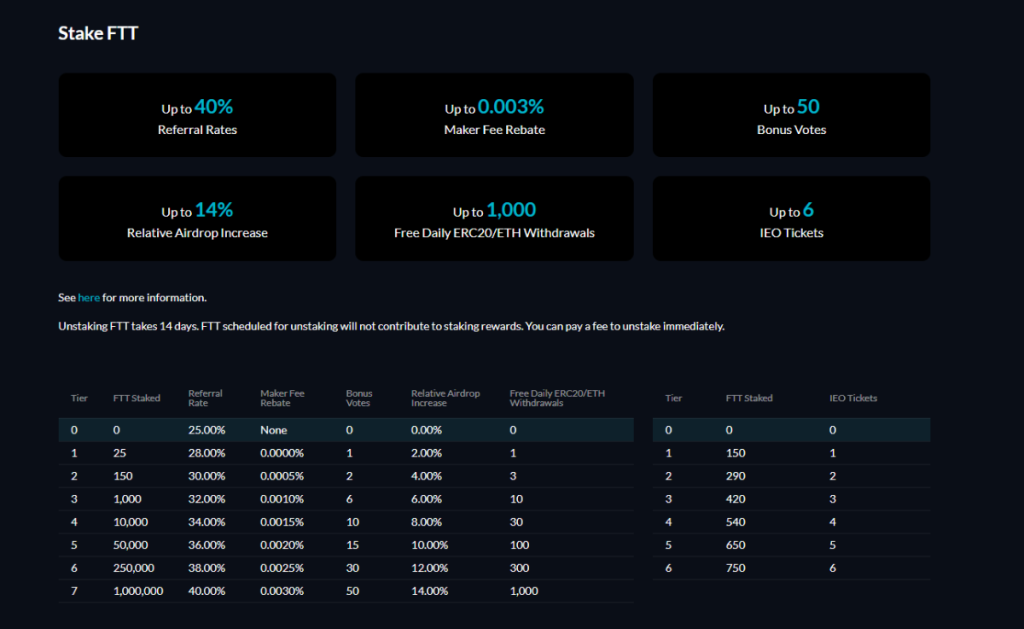
Prestito FTX
You can lend various assets on FTX to earn passive income, similar to traditional savings. At the moment, FTX supports the supplying of 106 assets. Among them, the lowest yield for lending assets on FTX is 0.88%/year for BTC, while the highest is 90%/year for AXS.
Further instructions on how to use FTX lending will be introduced later in this article.
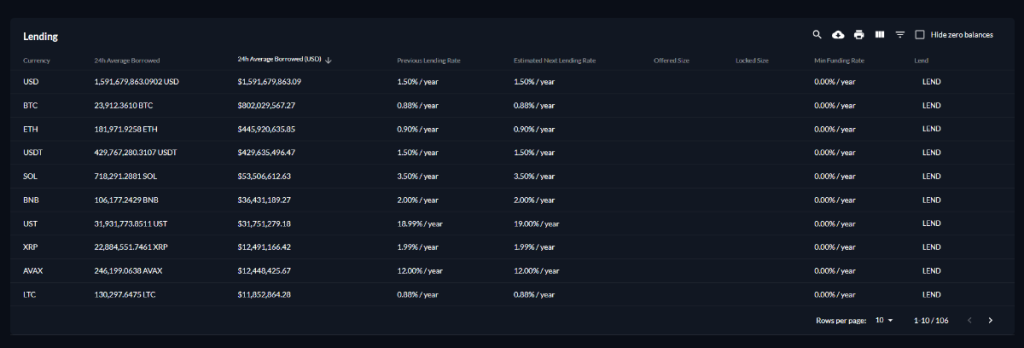
FTX Options
FTX also supports Options contracts. For those who don’t know, the Options feature is extremely identical to Futures, with the Call Option being similar to long and the Put Option being similar to short. The key difference between the two lies in their ultimate goal.
For Options contracts, you can choose whether or not to use them at their expiration date. However, once Futures contracts hit their expiration date, their conditions have to be fulfilled. That being said, Futures contracts must be executed at some point in the future. On the opposite, Options contracts can be left intact with no problem.
As a result, investors often use Options contracts as a hedging method, whereas they optimize Futures contracts for speculative purposes.
At the moment, FTX only supports BTC as the underlying asset for Options contracts.
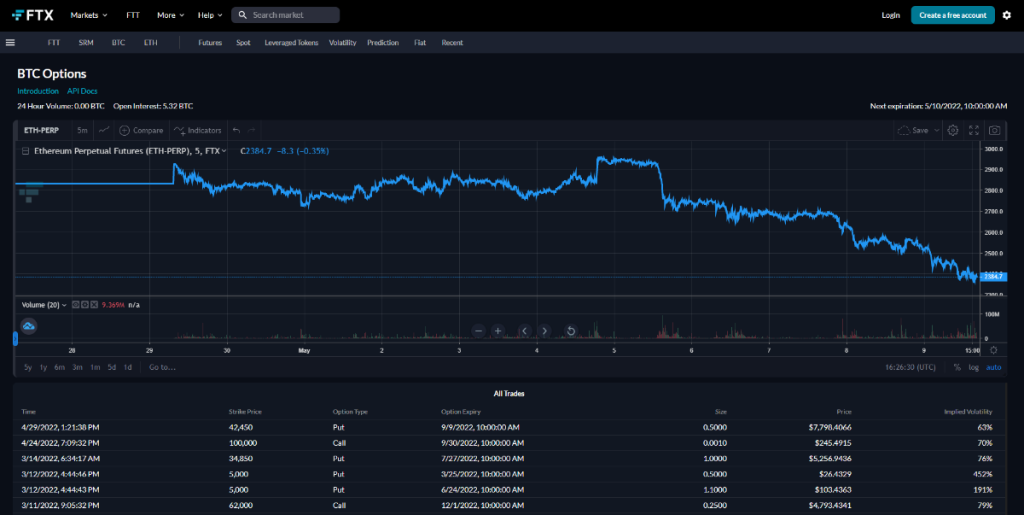
FTX Pay
FTX Pay is a widget that you can integrate into your product to start accepting crypto payments, with FTX being the third-party service provider.
FTX Pay used to be available on the original FTX. However, recently it has been moved to FTX US, so feel free to use FTX US for this particular feature.
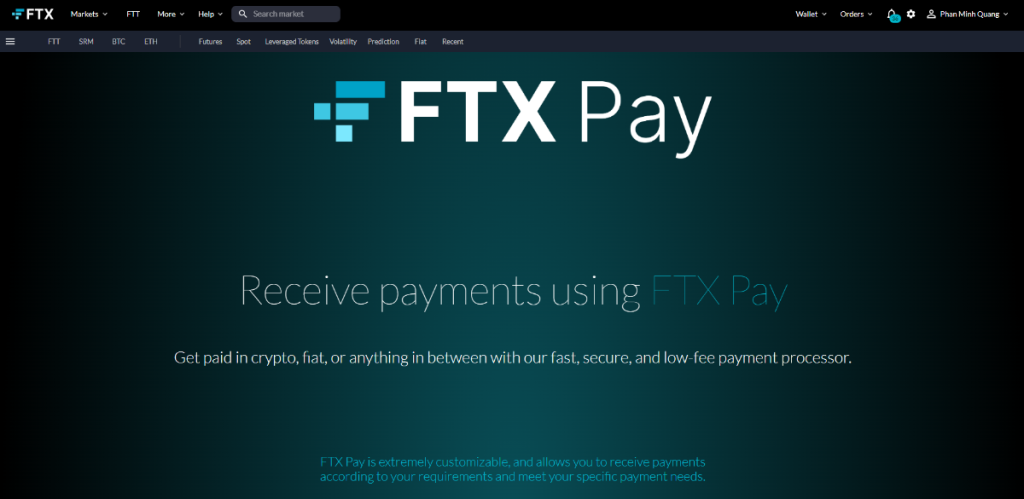
FTX Debit Card
FTX Debit Card is a special Visa Card made exclusively by FTX. The great thing about this Debit Card is that FTX charges 0 fees. This is a huge improvement compared to the Debit Card you normally get at the bank.
With FTX Debit Card, you can spend your crypto assets more easily and efficiently. You do not have to swap from crypto to fiat before paying anymore, as FTX will automatically do that work for you at the precise payout time.
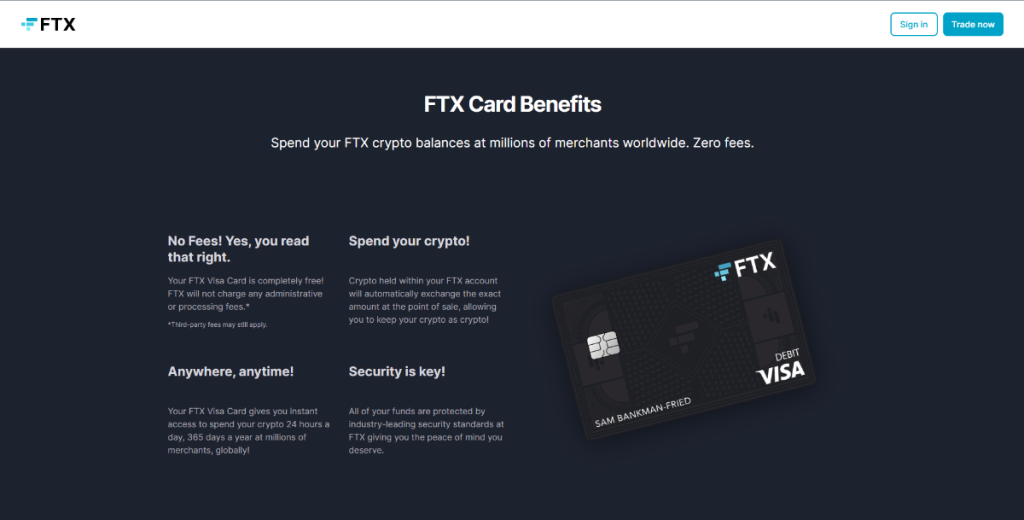
FTX NFTs
Recently, FTX has deployed an NFT Marketplace. It will be Solana-based with only a $3 minting cost. FTX will also charge a 2% exchange fee to the seller.
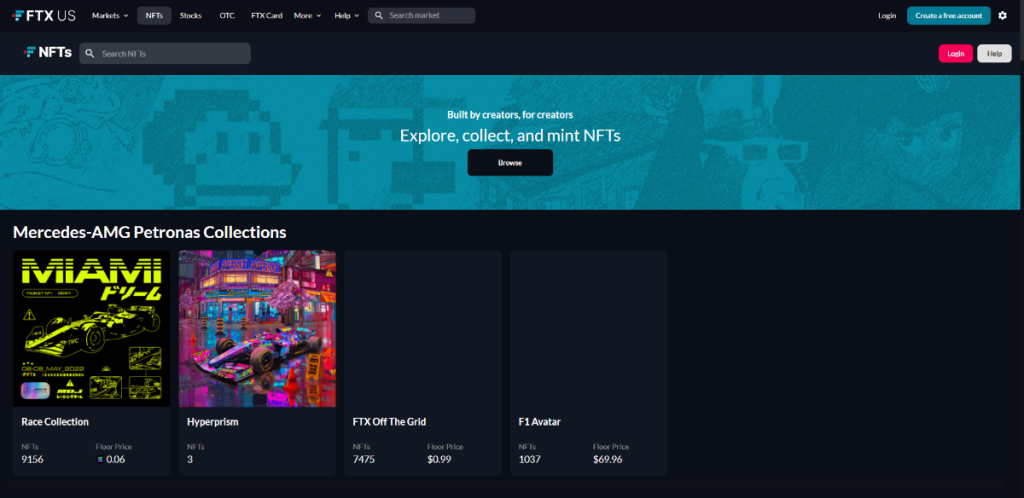
What are FTX Fees?
In this part, I will introduce to you all kinds of fees on FTX as well as on FTX US. At the same time, I will put up those data in parallel so that you can compare the fees on FTX vs FTX US.
Trading fees
First, let’s take a look at the trading fees on FTX. Maker fees are fees for “creating orders”, whereas Taker fees are fees for “filling orders”. FTX has 6 tiers for Makers and Takers based on trading volume per 30 days.

At the same time, these fees can be reduced by being an FTT holder or staker. Specifically, by staking only 25 FTT (~$850 at the moment of writing - May 10th, 2022), you won’t have to pay for Maker fees anymore. Staking more FTT allows you to even earn by being a Maker as its fees become negative. Further details are given in this table:

At the same time, FTX also benefits VIP users, which are defined based on the cumulative trading volume.

Now let’s look at FTX US. FTX US has 9 tiers for Maker and Taker fees, also on the basis of the 30-day trading volume.
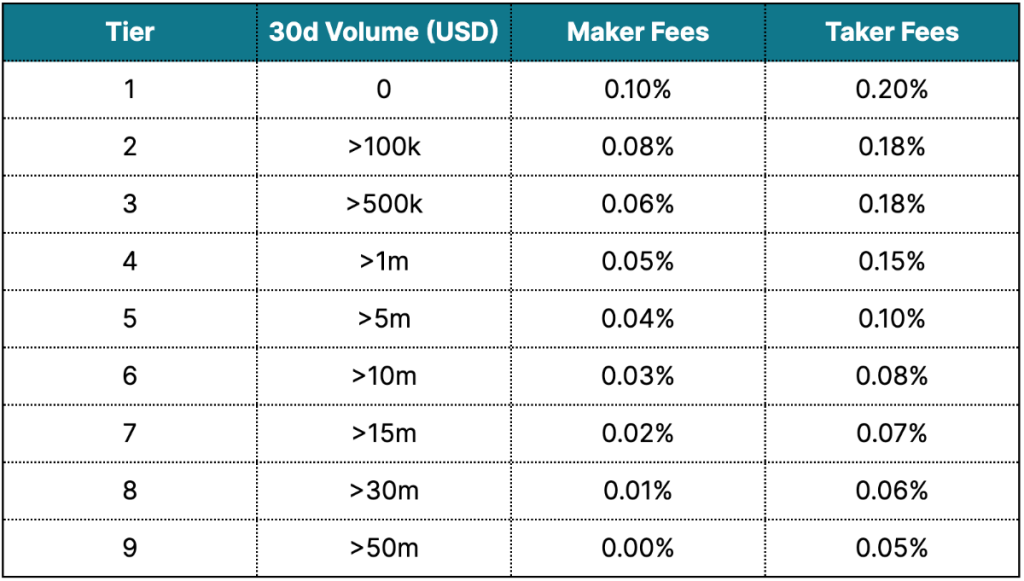
Unfortunately, FTT is currently not available for US residents. As such, there are no FTT holding or staking benefits for FTX US. Nevertheless, VIP privileges are still applied as follows:

Deposit and withdrawal fees
There are no fees on deposits and withdrawals, except for ETH, ERC-20 tokens, or small BTC withdrawals (< 0.01="" btc).="" however,="" you="" will="" have="" 1="" free="" btc="" withdrawal="" per="" day.="" ftx="" users="" will="" pay="" the="" blockchain="" fees="" for="" all="" eth="" and="" erc20="" tokens="" unless="" they="" have="" ftt="">
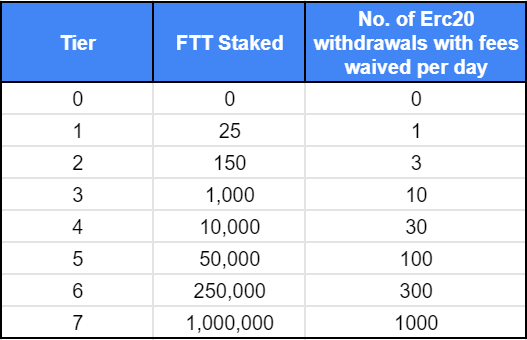
In the case of a user whose fiat/stablecoin deposit/withdrawal volume surpasses their trading volume, FTX may charge an extra fee of up to 0.1%.
FTX US works in a similar way as it pays crypto withdrawal blockchain fees for all tokens except for ERC20/ETH and small BTC token withdrawals. Again, there are no benefits for staking FTT as FTT is not available on FTX US.
Other fees
There are also other fees that you have to consider before using FTX and FTX US. For FTX:
- Futures contracts: 0 fees.
- Leveraged tokens: Creation and redemption fees of 0.10%, and daily management fees of 0.03%.
- Borrow/Margin trading: Fees vary for each asset.
- MOVE contracts: Fees depend on the price of the underlying index.
- OTC trading: 0 fees.
- Convert: 0 fees.
For FTX US:
- Borrow/Margin trading: Fees vary for each asset.
- Wire Withdrawal: You can withdraw below $5000 USD once per rolling week period. Additional withdrawals below $5000 will incur a $25 withdrawal fee. Withdrawals above $5000 USD are free.
- Wire Deposit: 0 fees.
- ACH: $0.50 per ACH is the standard fee. You will not be charged a fee if this is your first ACH deposit, the deposit is over $100, or the deposit is over $10, and you have deposited via ACH within the previous week.
- NFT: 2% fees charged to the NFT seller, and $3 for minting/listing NFT.
How to use FTX Exchange basically
In this part, I will guide you through FTX and how to use this exchange.
How to create an account on FTX Exchange
To create an account on FTX, click on: coin98.xyz/ftx
Or you can go to FTX’s website here. Then, on the top right corner, click on “Create a free account”.
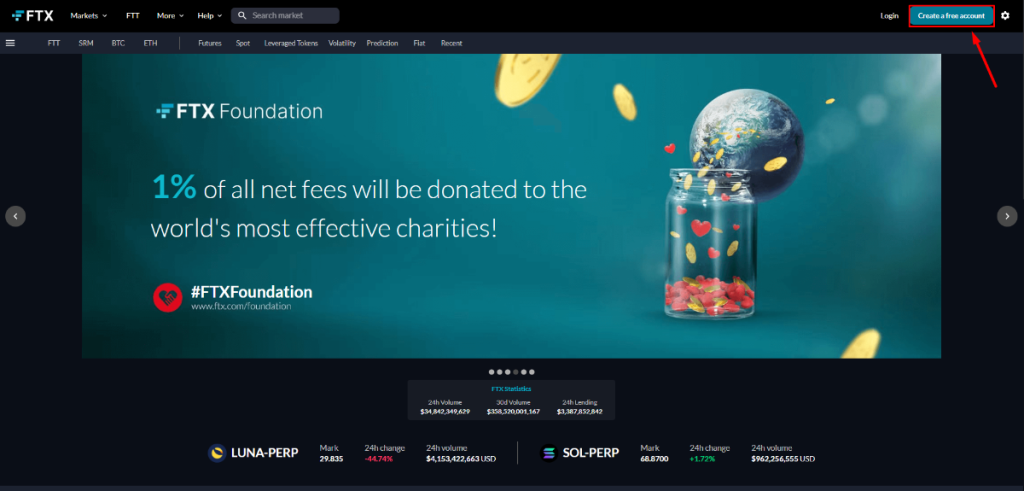
Here you have 3 options: You can sign in using your Apple or Google account, or you can create a completely new FTX account. Here I will create an FTX account as an example.
Fill in your email address along with the password, then click on the checkbox to agree to the FTX Terms of Service. If your account is legitimate, you can proceed by clicking on “Create Account”.
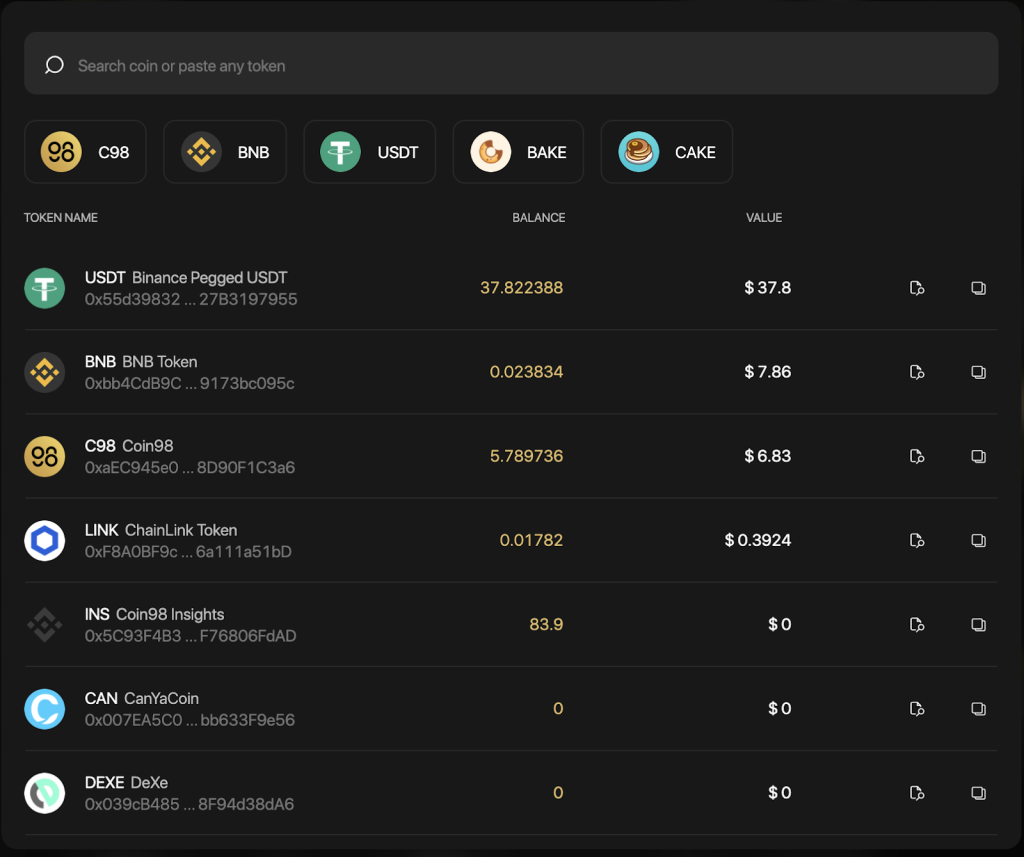
Your account has been created. To use your account, fill in your personal information, including first name, last name, and date of birth. Continue by clicking on “Continue”.
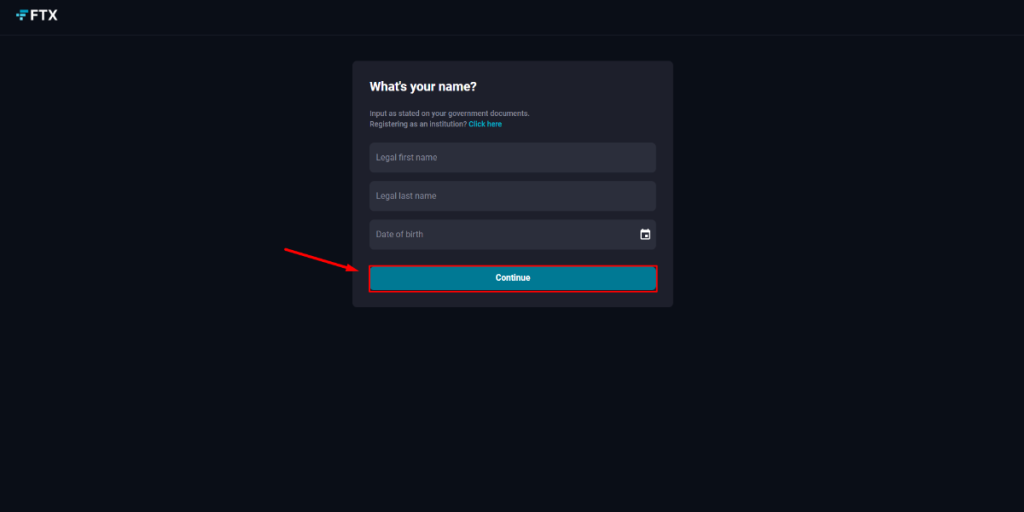
FTX will ask you to enter your home address. Finish filling in all the information and go forward with “Continue”.
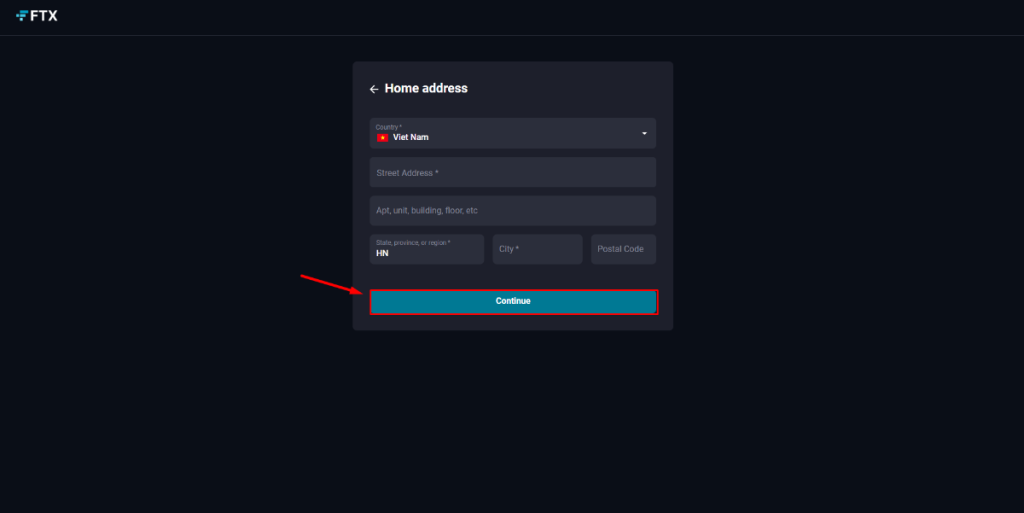
Enter your phone number and click on “Send Code” to receive the 6-digit code FTX sends to your mobile phone. Enter the verification code and click on “Submit”.
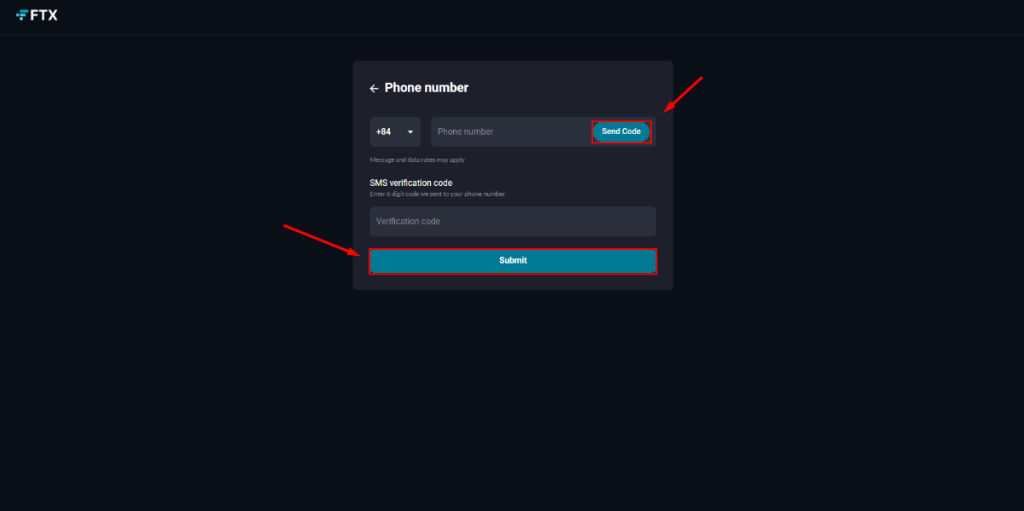
Congratulations! You have successfully created an FTX account.
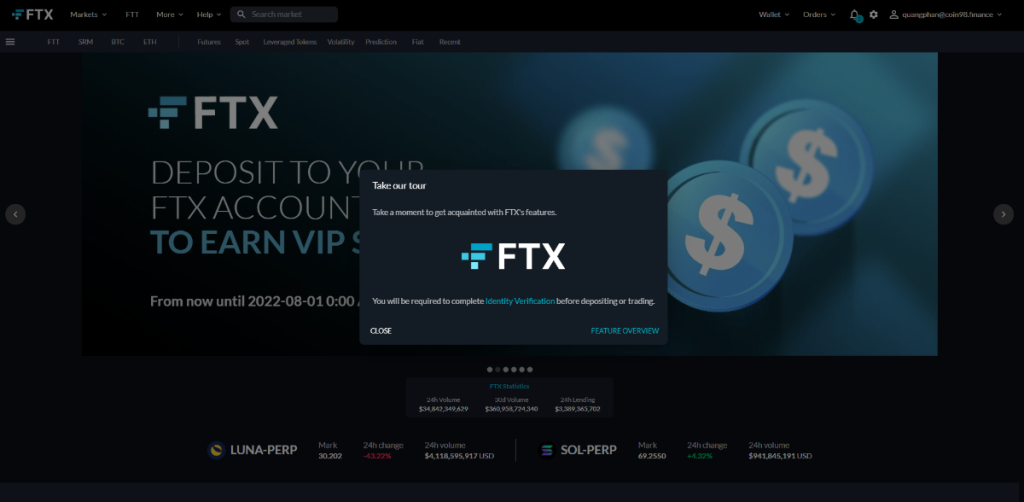
How to complete Identity Verification Level 2 on FTX
Identity Verification Level 2 First, point to your account name on the top right corner. A list will appear. Select “Settings”.
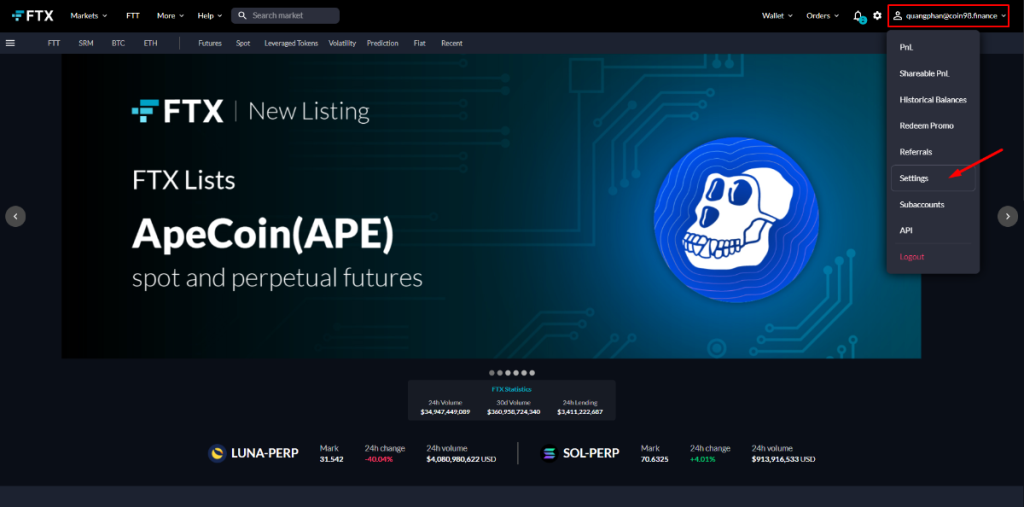
Change to the “Identity Verification” tab.
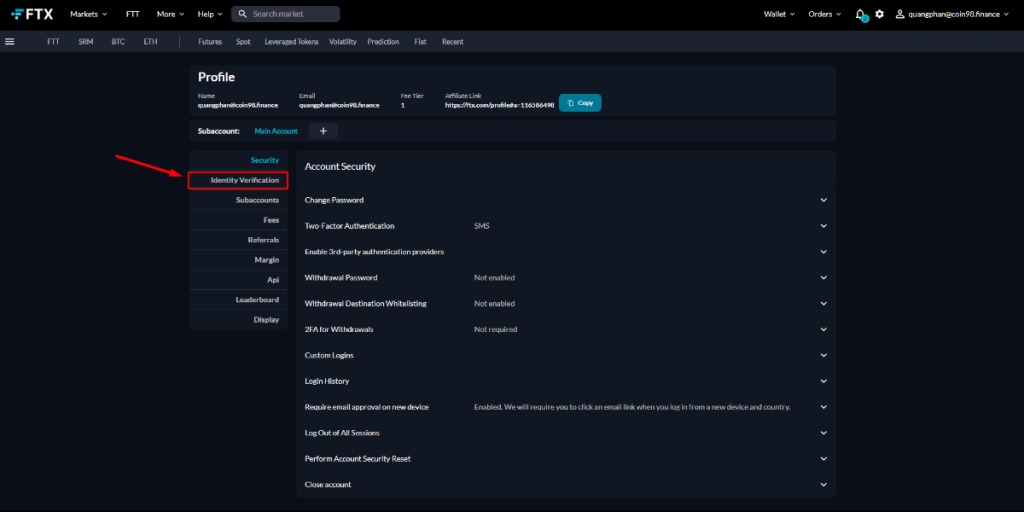
Click on “Continue” to proceed.
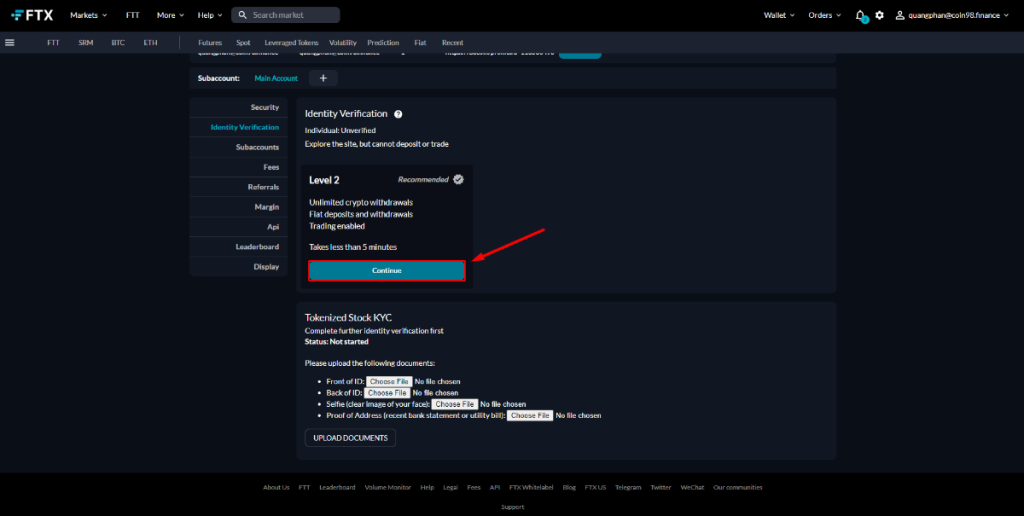
You will be asked about your source of funds. Any choice is fine.
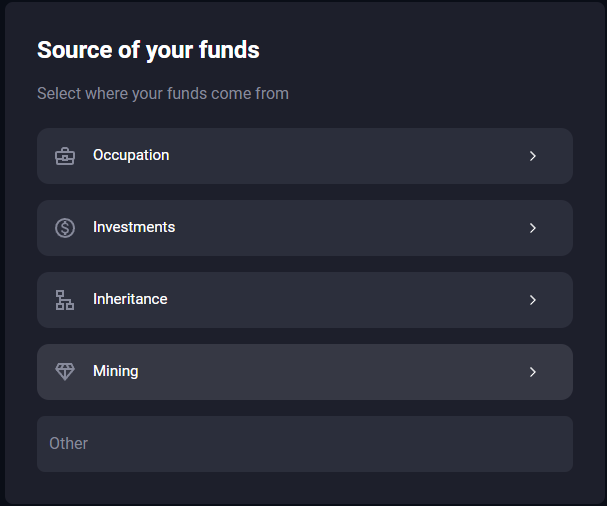
Click on “Continue” and follow the instructions to finish setting up your Identity Verification Level 2 on FTX.
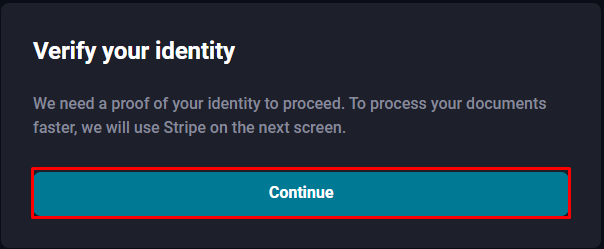
How to complete Institutional Account KYC on FTX
To set up an Institutional Account on FTX, you have to create a specialized account. First, go to FTX’s website here. Then, on the top right corner, click on “Create a free account”.
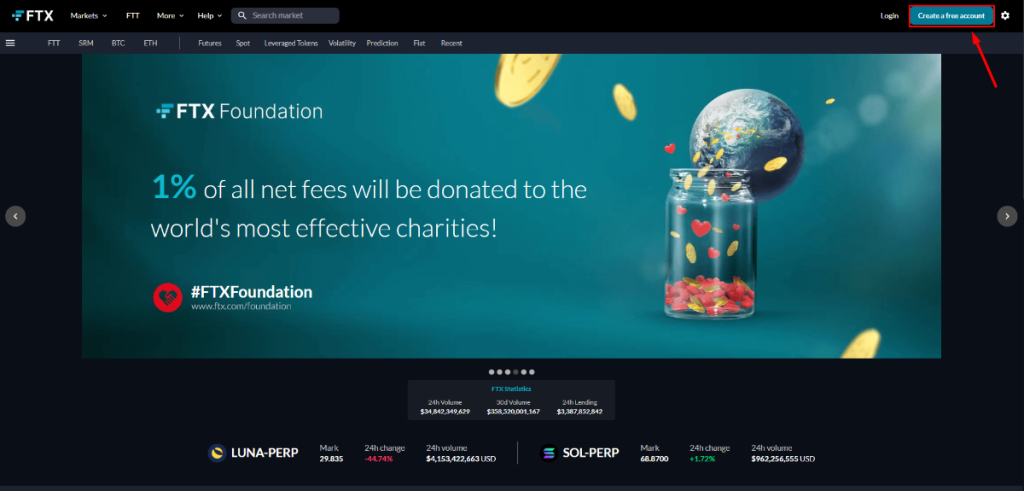
Fill in your email address along with the password, then click on the checkbox to agree to the FTX Terms of Service. If your account is legitimate, you can proceed by clicking on “Create Account”.
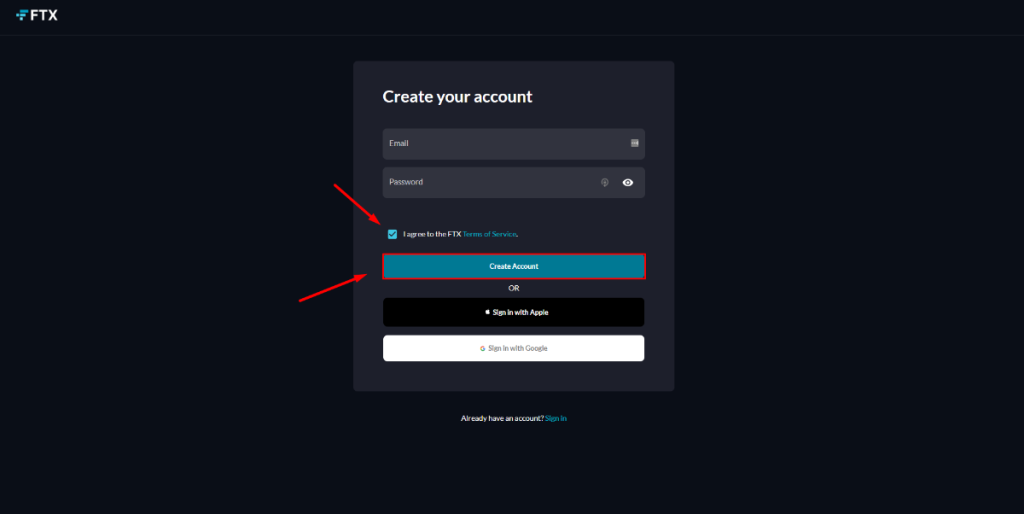
Here, instead of entering your personal information to create a normal account, you have a choice to register as an institution. Choose “Click here”.
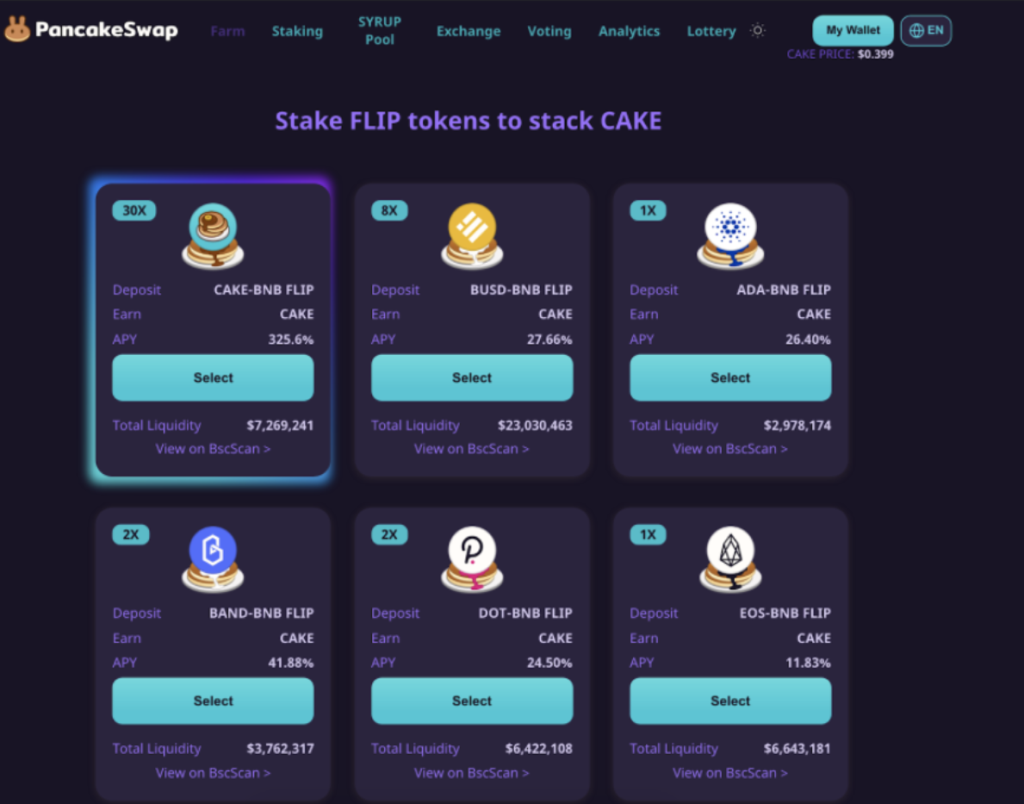
You will then be required to fill in the information of your institution. Follow the instructions on FTX to complete your institutional account KYC.
How to enable 2FA on FTX
2FA (Two Factor Authentication) is a way to increase the security of your FTX account by adding an additional layer of authentication. It is highly recommended to enable this feature on any CEX.
To turn on 2FA on FTX, first, point to your account name on the top right corner. A list will appear. Select “Settings”.
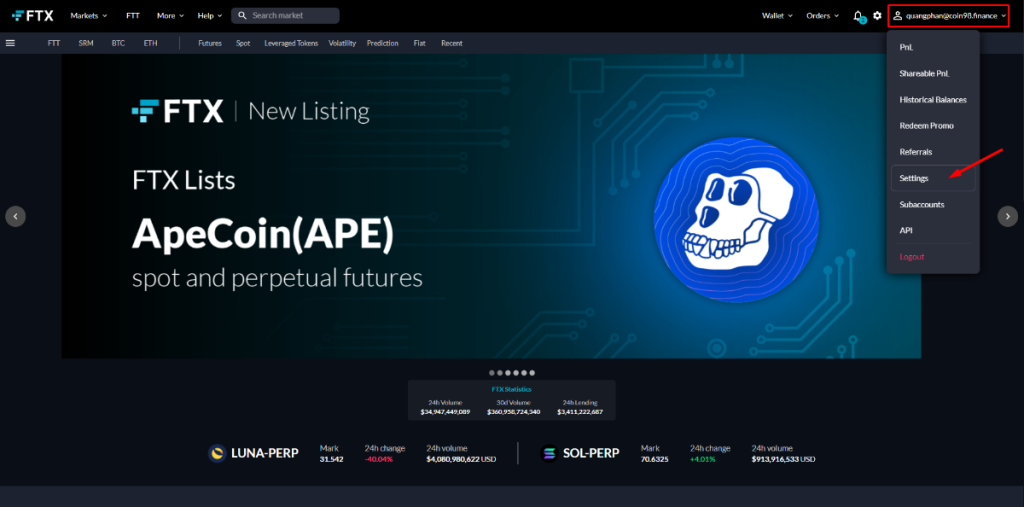
You can see that SMS has been automatically selected as your 2FA authentication. If you wish to change it, click on the line “Two-Factor Authentication”.
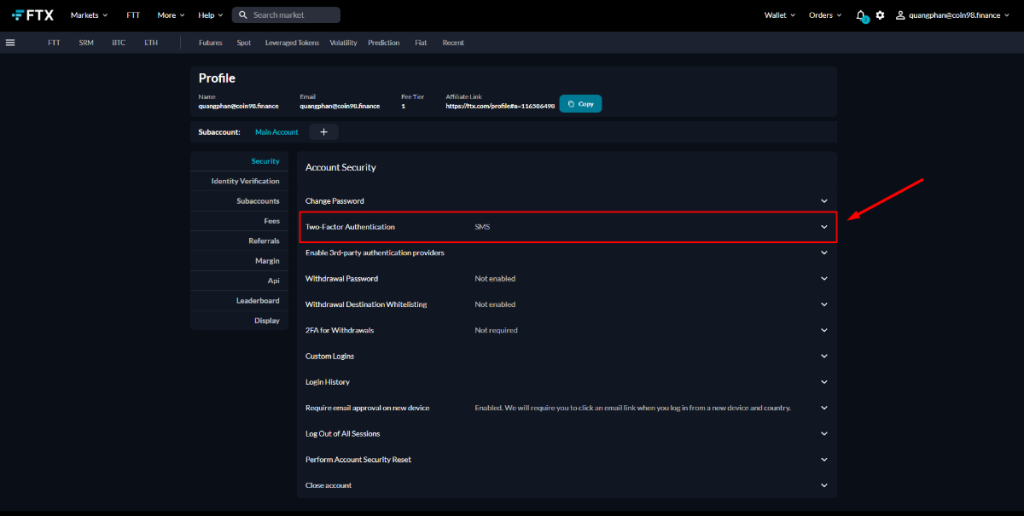
Click on “Switch Two-Factor Authentication Method”.
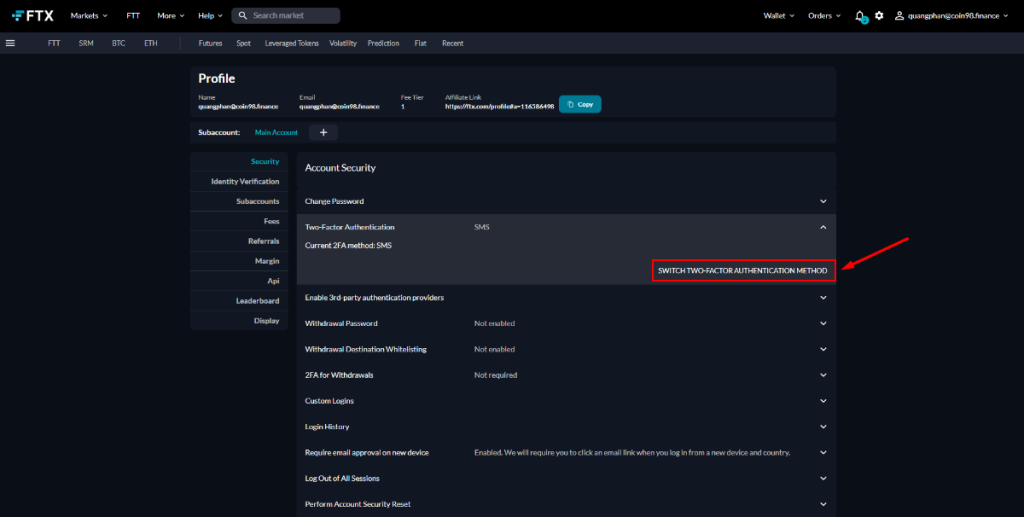
A screen will pop up to remind you that once you change your 2FA on FTX, you will be suspended from withdrawing for 24 hours as a security measure. Click on “I understand” to continue.
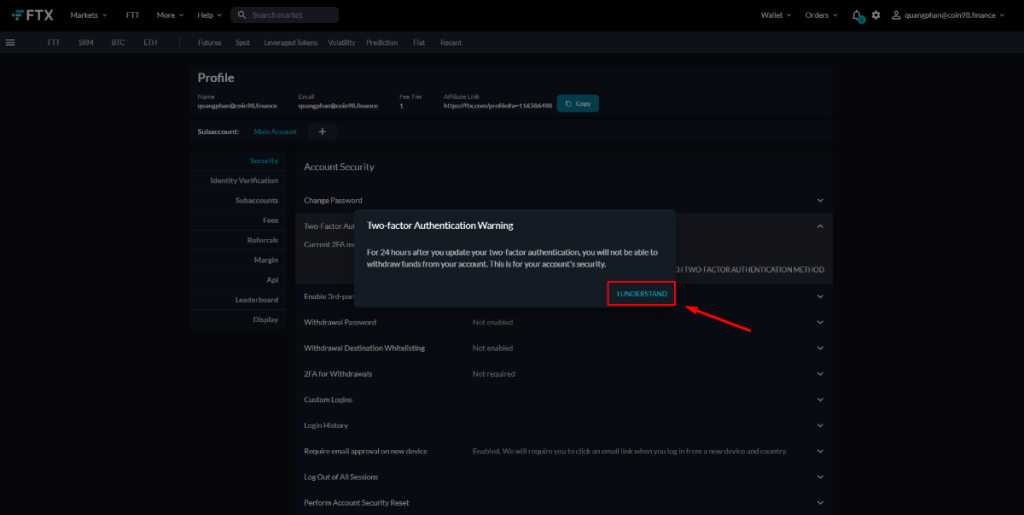
Here you will be given 3 options: Switch to Authy/Google Authenticator, Switch to Security Key (Fido, U2F, Yubikey), and Switch Device. I highly recommend you to select “Switch to Authy/Google Authenticator” as it is, in my opinion, the easiest and most secure way to set up your 2FA.
Coin98 has had a detailed article on how to use Authy and Google Authenticator. Click on “Switch to Authy/Google Authenticator” and refer to these articles in order to finish setting up your 2FA on FTX.
How to deposit into FTX
To deposit assets into FTX, make sure that you have passed the Level 2 KYC. Refer to the heading “How to complete Identity Verification Level 2 on FTX” if you have not gone through this process.
Now let’s get into the details of the deposit process. First, on the main page, point to “Wallet”. A few options will appear. Select “Portfolio”.
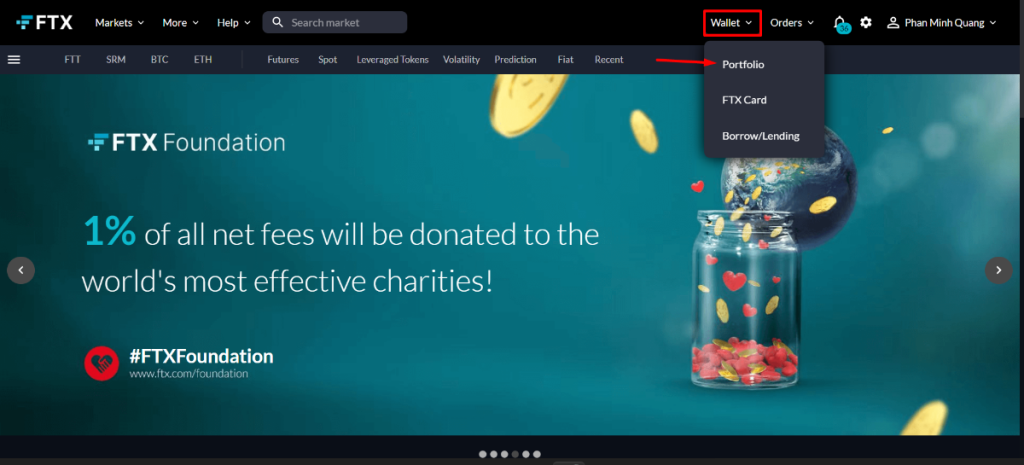
On this page, choose the asset that you want to deposit, and click on “Deposit”. You can search for your wanted token by clicking on the search icon. Depositing “USD” is highly recommended as FTX has made it one of the easiest ways to deposit into the platform. Therefore, I will deposit into this category as an example.
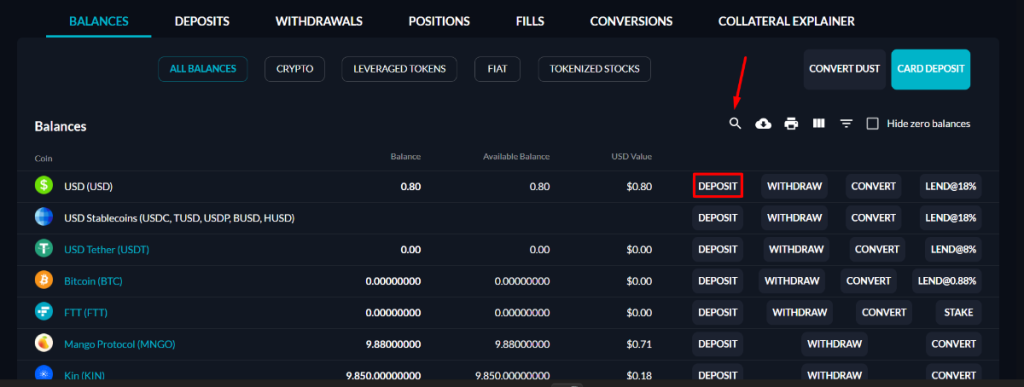
There are now 4 options for you to choose from:
- USD Stablecoins (USDC, BUSD, HUSD, TUSD, USDP).
- Credit or Debit Card.
- Wire Transfer.
- Cryptocurrencies.
I will use USD Stablecoins in this example.
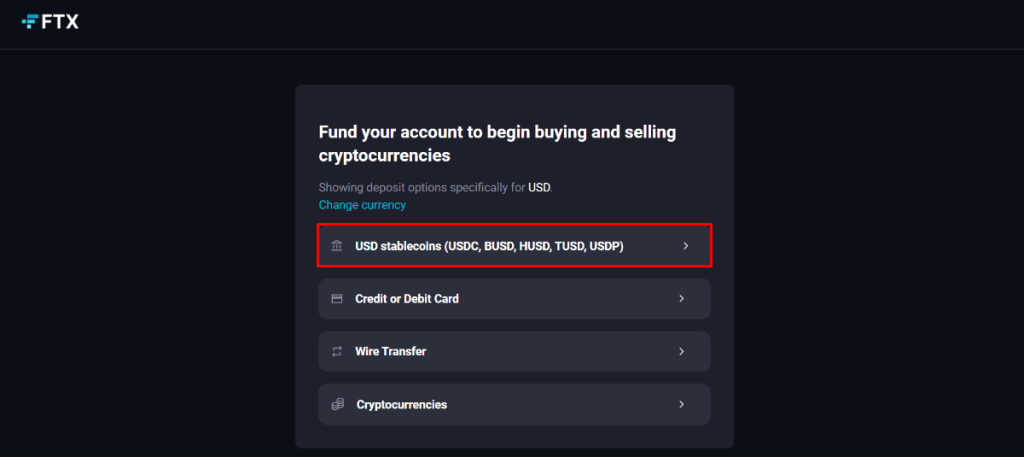
You can choose which type of stablecoin you would want to deposit. FTX currently supports 5 stablecoins: USDC, BUSD, HUSD, TUSD, and USDP. I will use USDC as an example.
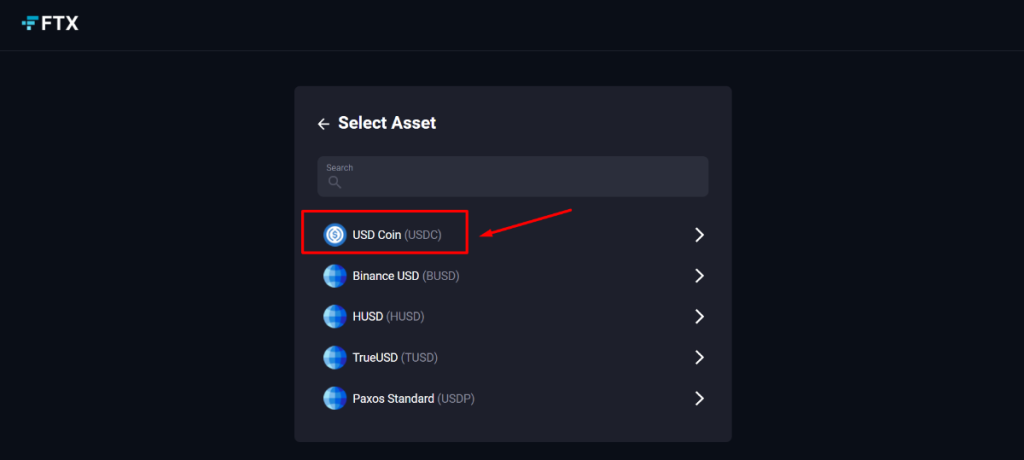
Supported networks along with a corresponding wallet address will be shown. Carefully select the network you are using, and transfer your USDC to the wallet address FTX provides. If you either select the wrong network or transfer tokens to the wrong address, FTX will not be able to receive your deposit.
Once you send your assets to the right wallet address on the correct network, it will take a few minutes for the blockchain to handle the transaction. Afterwards, your assets will be automatically received and shown on FTX.
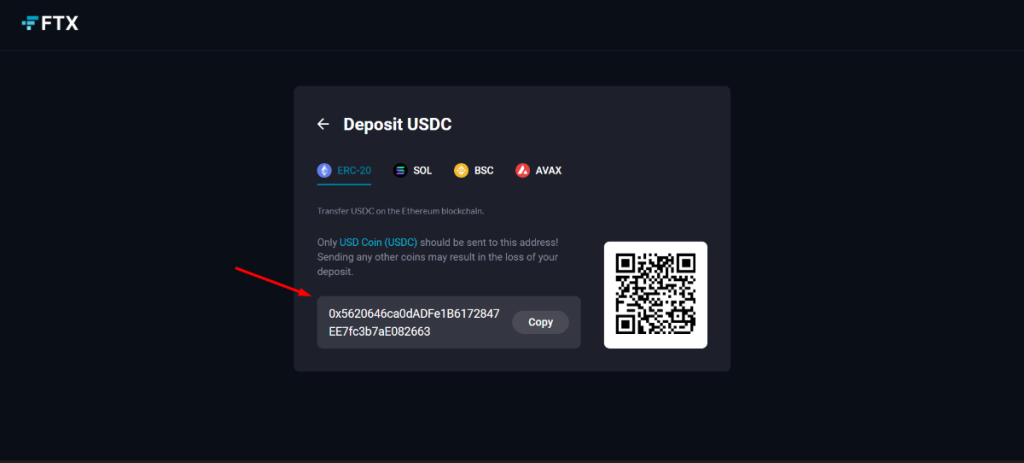
How to withdraw from FTX
The process of withdrawing on FTX is similar to depositing. On the Portfolio page, select the asset that you want to withdraw and click on “Withdraw”. I will use USD as an example.
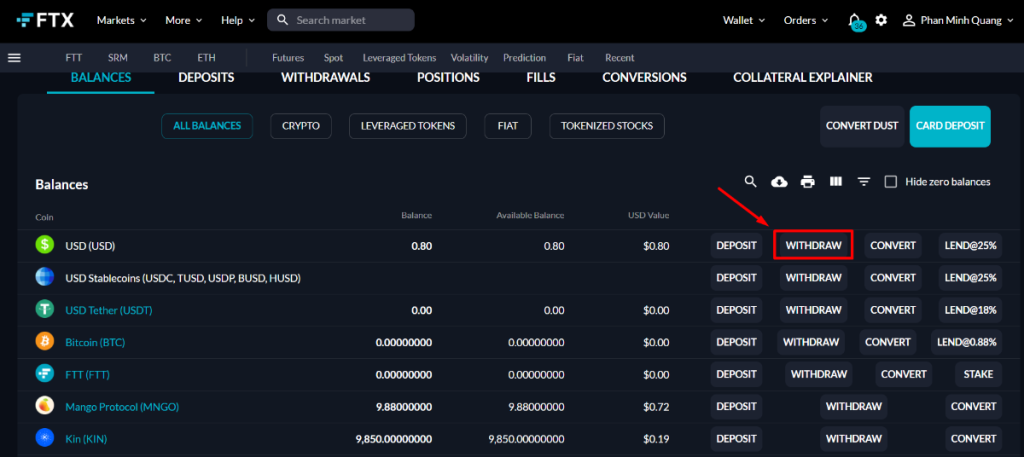
You can withdraw USD to various stablecoins or Fiat. At the moment, FTX supports 6 stablecoins, including USDC, BUSD, TUSD, HUSD, USDP, and USDT. You can also withdraw USD from FTX to directly Fiat in your bank account.
I will use USDC in this example. Choose “Withdraw USDC”.
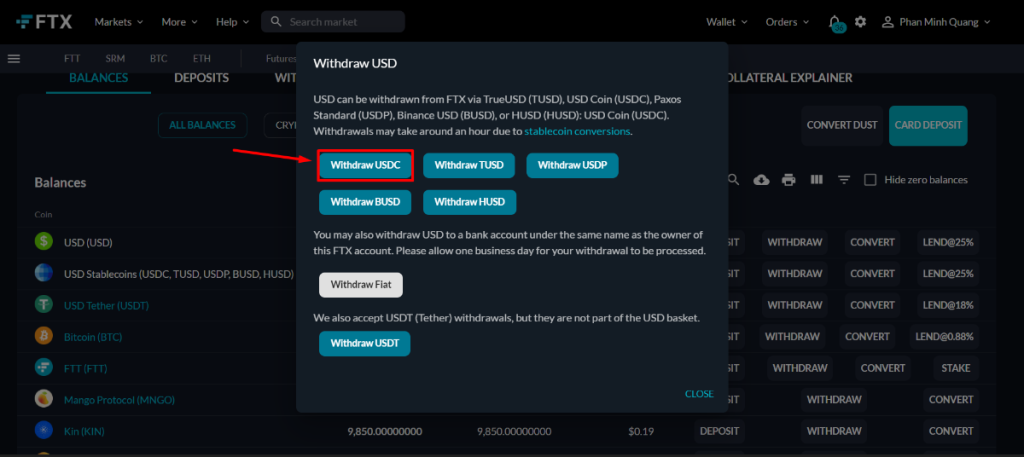
At this step, you have to fill in the information about your withdrawal. This includes:
- Amount: The amount you want to withdraw.
- USDC Address: Enter the wallet address that you want to withdraw to.
- Withdrawal Method: The blockchain platform that you are using for this specific address/asset. For USDC, FTX currently supports 4 networks: Ethereum (ERC-20), BSC (BEP-20), Solana (SPL), and AVAX.
- Authy/GA 2FA Code: The authentication code taken from Authy/Google Authenticator.
After entering all of the information, click on “Withdraw”.
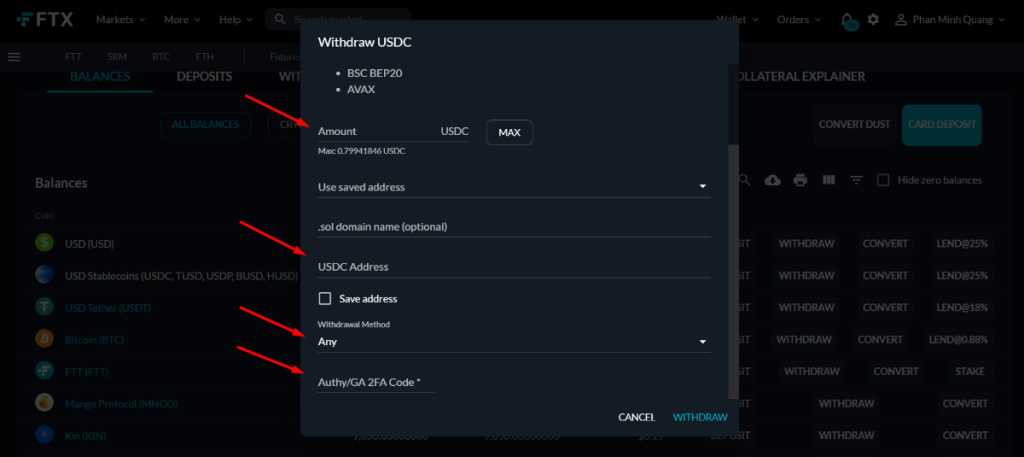
How to buy/sell tokens on FTX
On the front page, click on the “Search market” bar and find the token that you want to buy or sell.
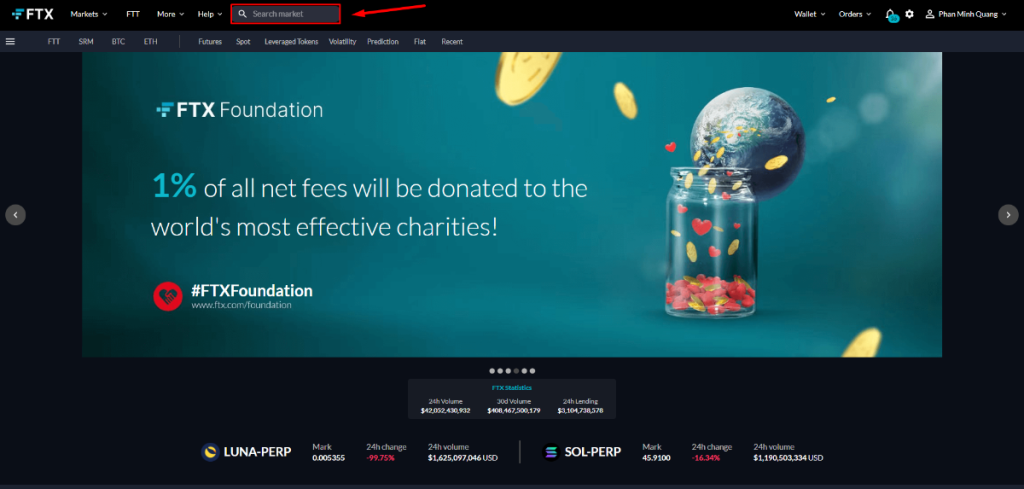
I will use SOL as an example. When I search for SOL, there will appear numerous pairs and types (Spot, Perpetual, Futures,...). You should choose the one that suits your demand. I will select SOL/USD as an example.
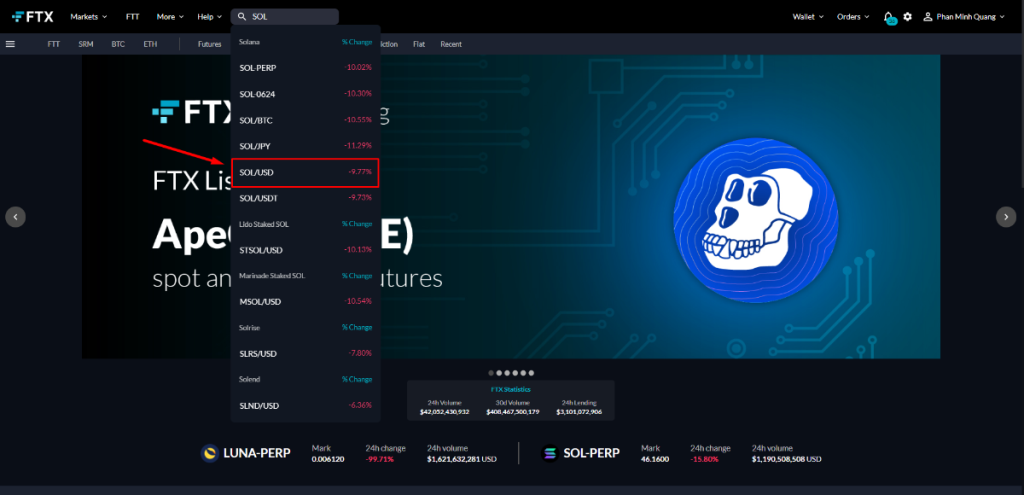
FTX Market orderbook will be shown. Here you can see the price chart, orderbook orders, as well as market trades. The option to either buy or sell is on the top right of the screen, as shown in the picture below
There will be multiple options available when you choose to buy/sell:
- Entry price: The price that you want to buy/sell the token.
- Type: Select the type of order - limit order or market order. Further explanations about these two will be discussed below.
- Take profit exit/% gain: Customize at what price/% gain you want to sell your token.
- Stop loss/% loss: Customize at what price/% loss you want to sell your token.
- Amount: Choose the amount you want to buy/sell.
Once you have filled out all the details, click on “Place Orders” to execute the buy/sell order.
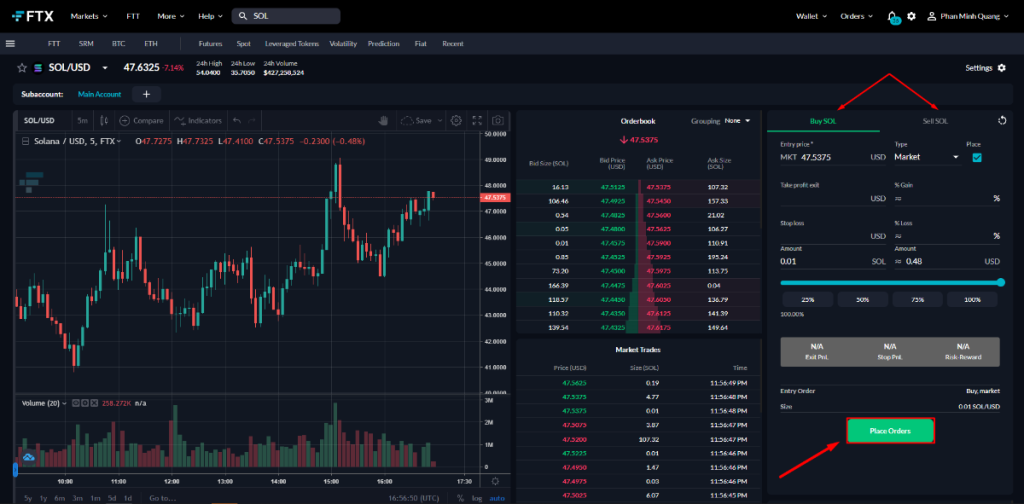
Types of Orders you must know when trading on FTX
There are various types of trading orders. On FTX, there are 4 kinds of orders that you have to know before trading.
- Limit Order: Allows users to buy or sell tokens at a predetermined price. If the market price does not reach the user’s set price, the order will not be executed.
- Market Order: Is a more basic type of trade. Market Order allows users to immediately execute the order at the current market price. It is guaranteed that you can buy/sell your tokens instantly.
- Stop Market Order (Stop Loss Order): Allows users to place a Market Order right when a specified price hits. This is made to prevent serious losses when the market crashes.
- Stop Limit Order: Works pretty similarly to Stop Market Order as they are both order types that will be executed when the price reaches a predefined number. The difference is that, while Stop Loss Order immediately sells your asset at market price when it is triggered, Stop Limit Order splits it into 2 different functions.
For Stop Limit Order, there will be a stop price that converts the order to a sell order and a limit price that determines the selling price. This is made to prevent flash crash events that are followed by a quick market recovery, which may cause you to sell at a lower price than predicted.
How to trade on FTX Exchange
How to leverage trade on FTX
Margin Trading is initially disabled on your FTX account. To open this feature, first, point to your account name on the right. A few options will show up, select “Settings”.
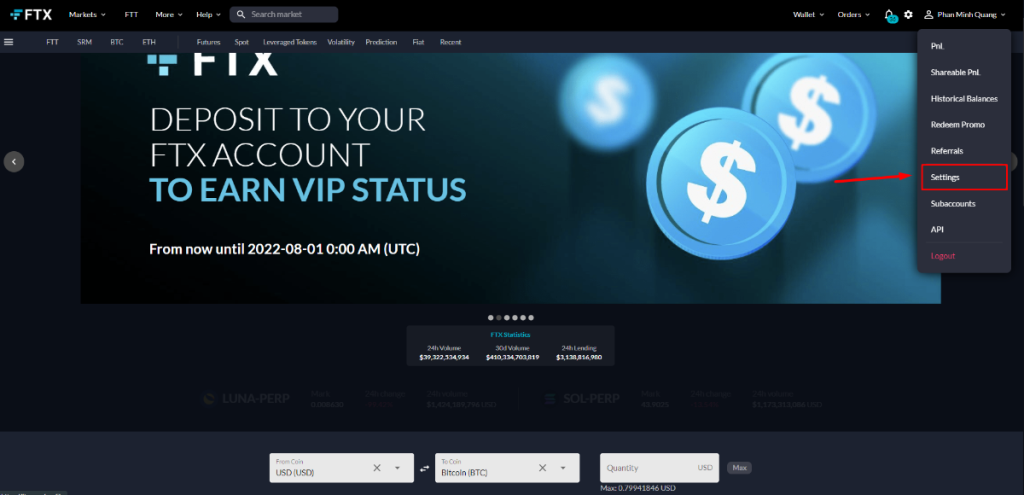
Choose “Margin”.
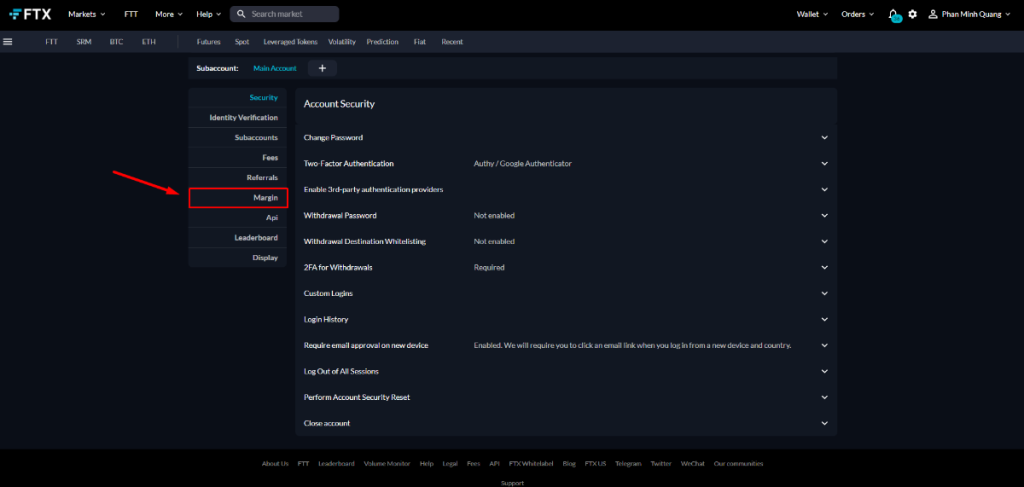
Click on “Enable Spot Margin Trading”. In this section, you can also change your margin leverage.
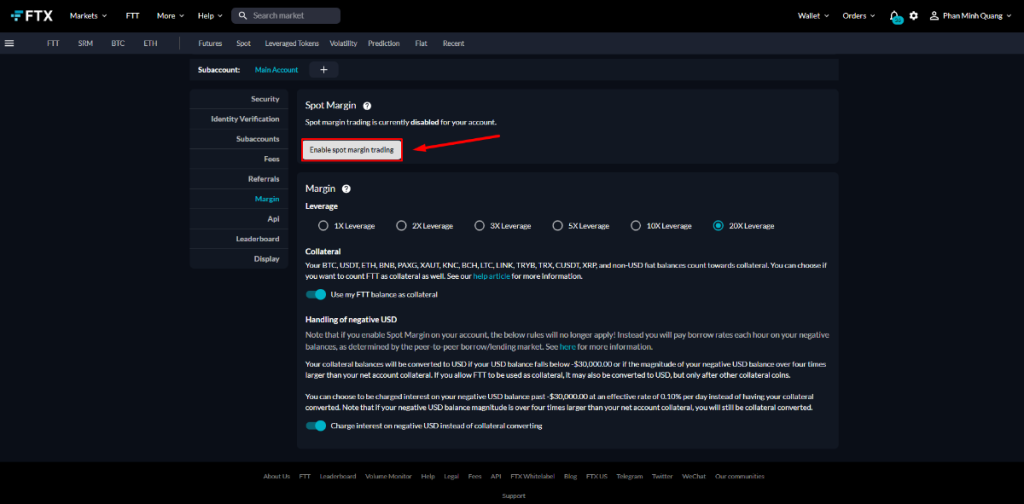
Spot Margin Trading is now available on your account. Click on “View Borrows” to check the borrow rates of all supported assets on FTX.
You can now leverage your trade easily. Simply go to the spot market of an asset (Refer to the above heading: “How to buy/sell tokens on FTX” for a detailed guide) and turn on “Margin”.
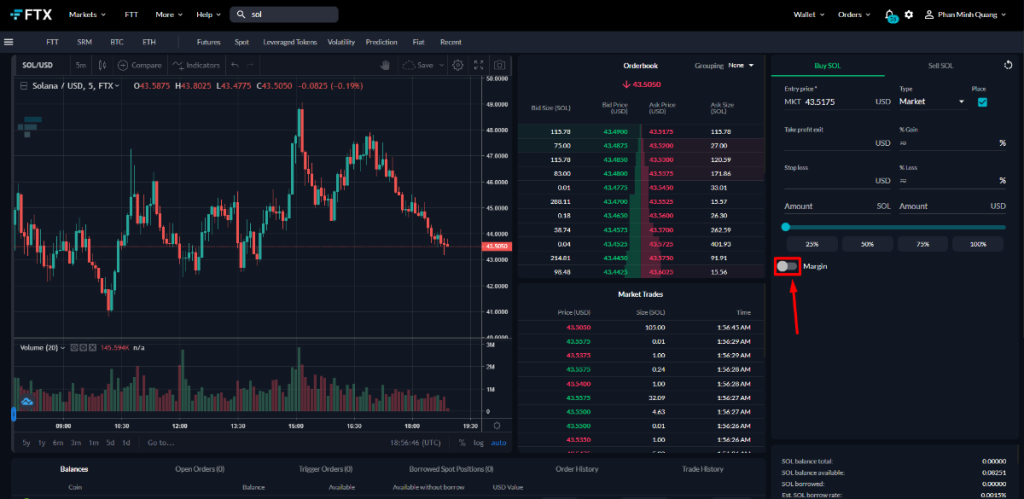
How to trade futures on FTX
On the main page, click on the “Menu icon” on the top left of the screen.
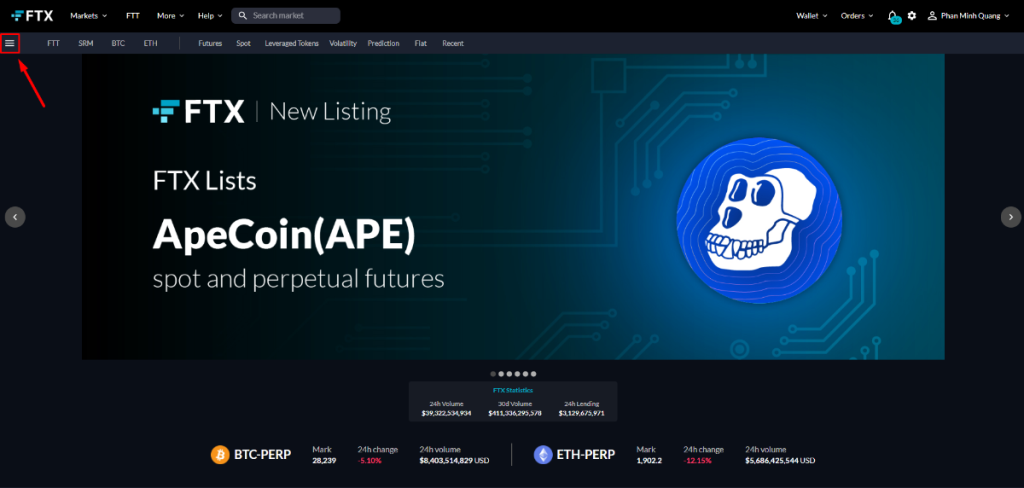
All Futures contracts on FTX are shown here. Search for the contract that you want to trade. I will use BTC-PERP as an example.
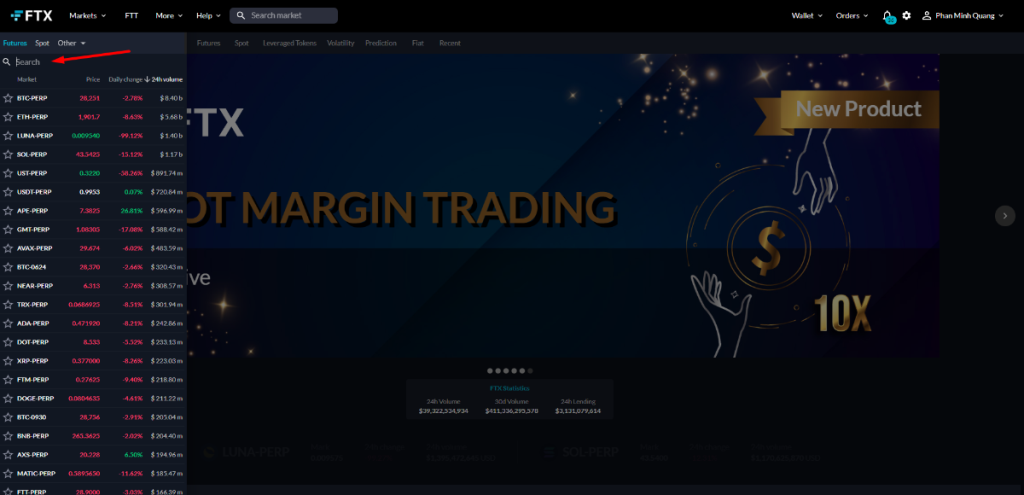
Trading Futures is similar to trading spot, as both have the same interface. Your leverage will automatically be applied to your order size. Click on “Place Orders” to execute your order.
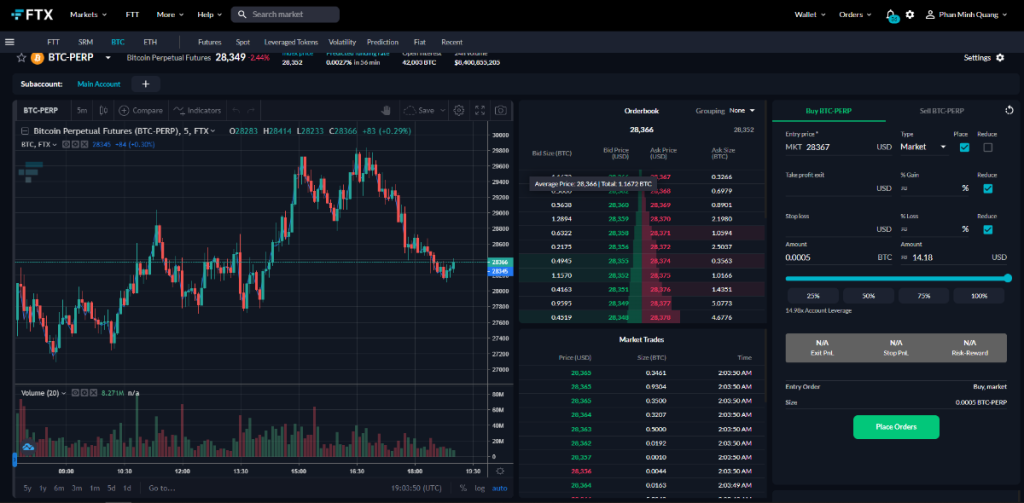
How to use earn on FTX Exchange
You can earn on FTX Exchange using various tools and features. In this part, I will introduce you to each of them as well as how to use them for profit.
How to lend on FTX
On the main page, point to “Wallet” and choose “Portfolio”.
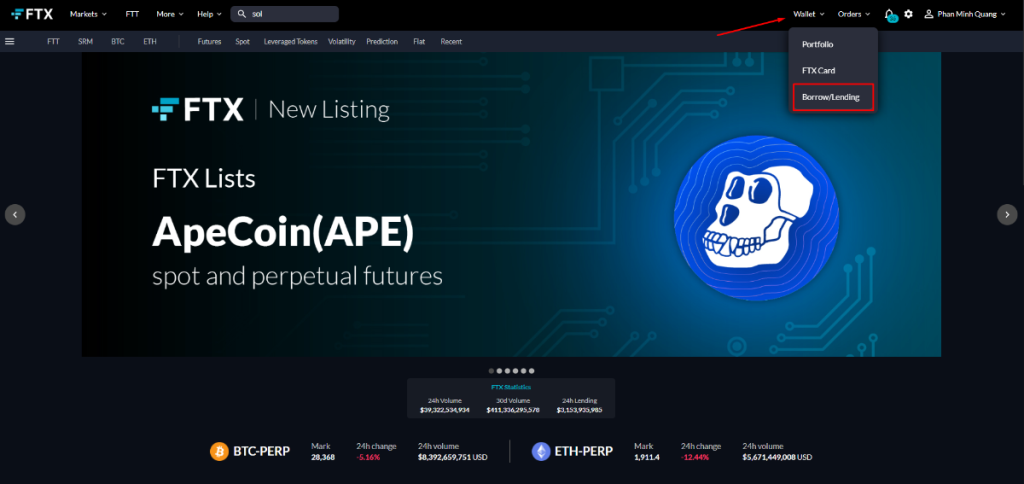
All supported assets for lending will be available on this page, as well as their lending rate. Choose the token that you want to lend, or click on the “Search icon” to find a specific one. Afterwards, click on “Lend”. I will use USD as an example.
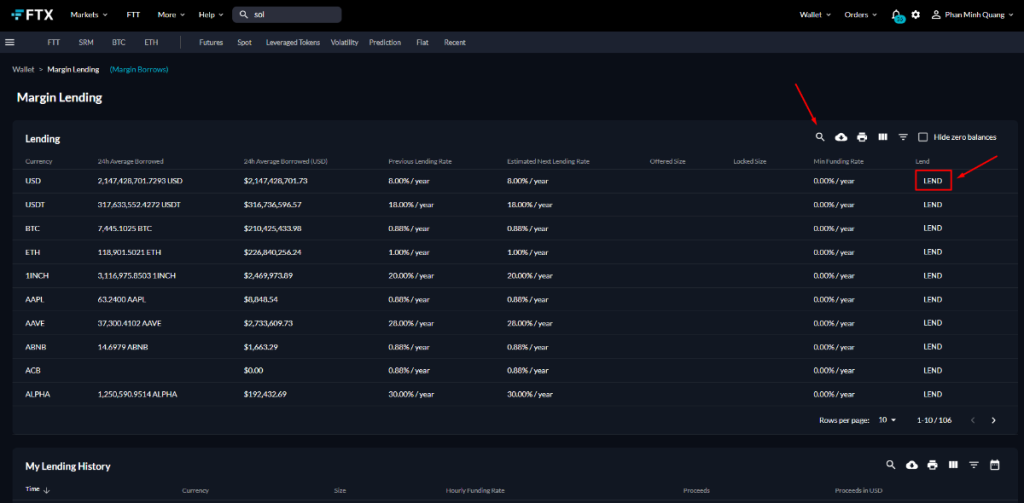
Enter the amount that you want to lend. Look over the information carefully before lending. Do bear in mind that if your funds are matched with a borrower, your funds will remain locked for up to 1 hour after you cancel your offer. When you finish, click “Save”.
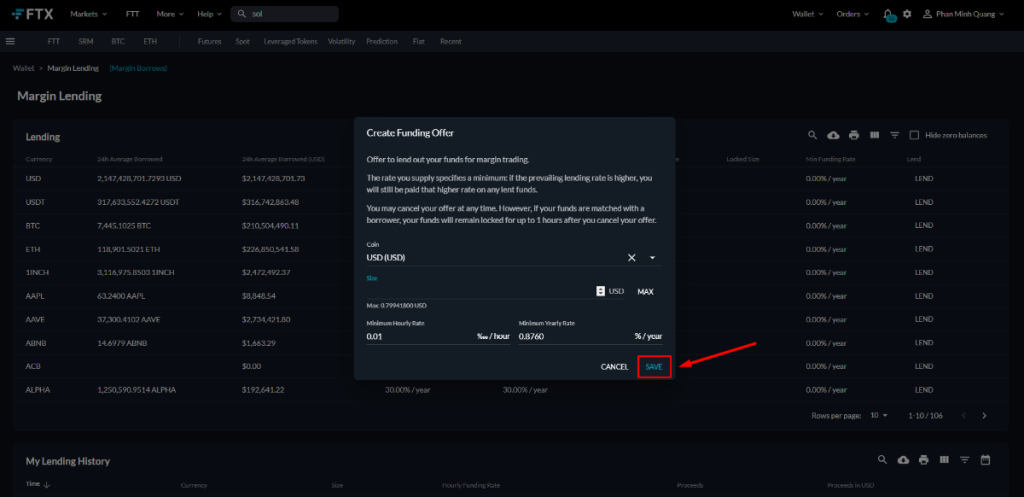
How to stake on FTX
Staking is one of the easiest and safest ways to earn passive income. On the main page of FTX, click on “More” and select “Stake”.
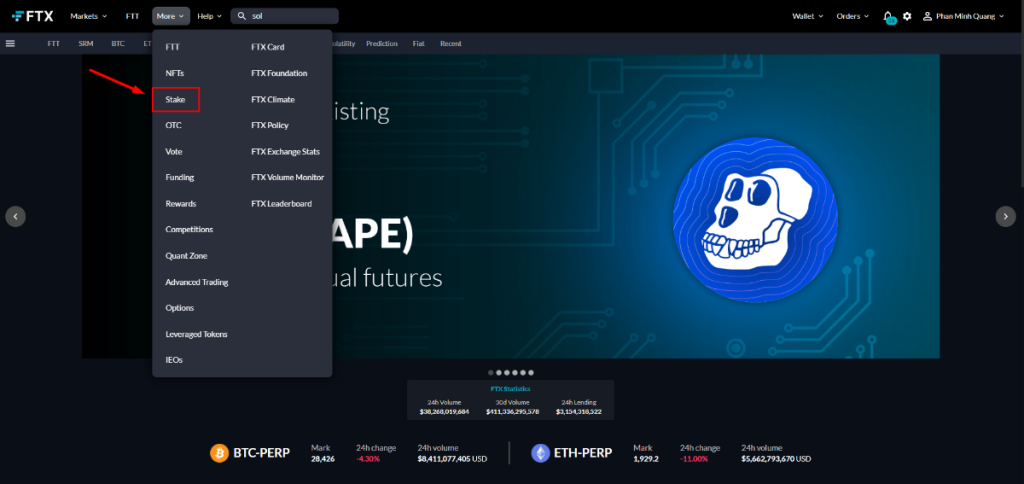
For the time being, FTX only supports staking FTT. Click on “Stake” at the bottom right of the screen.
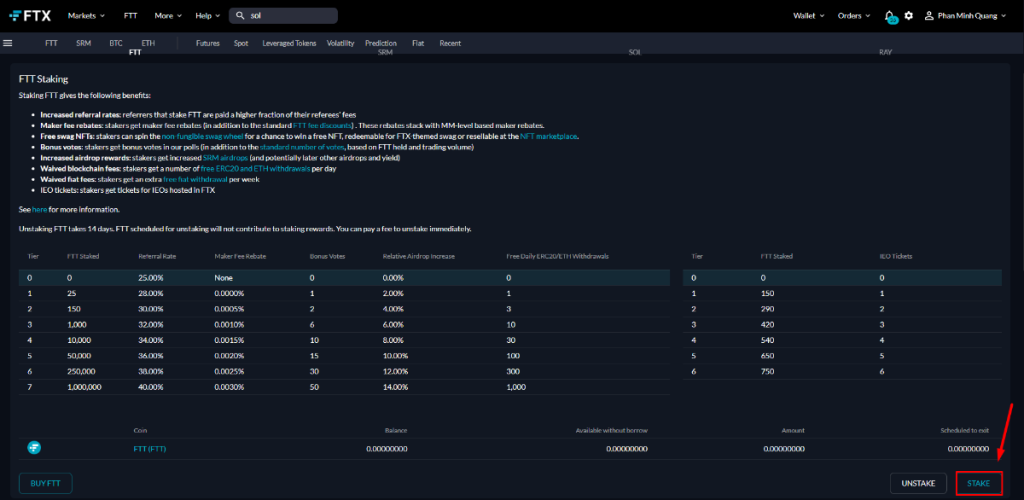
Enter the amount of FTT to stake, then click on “Stake”. You have successfully staked FTT on FTX.
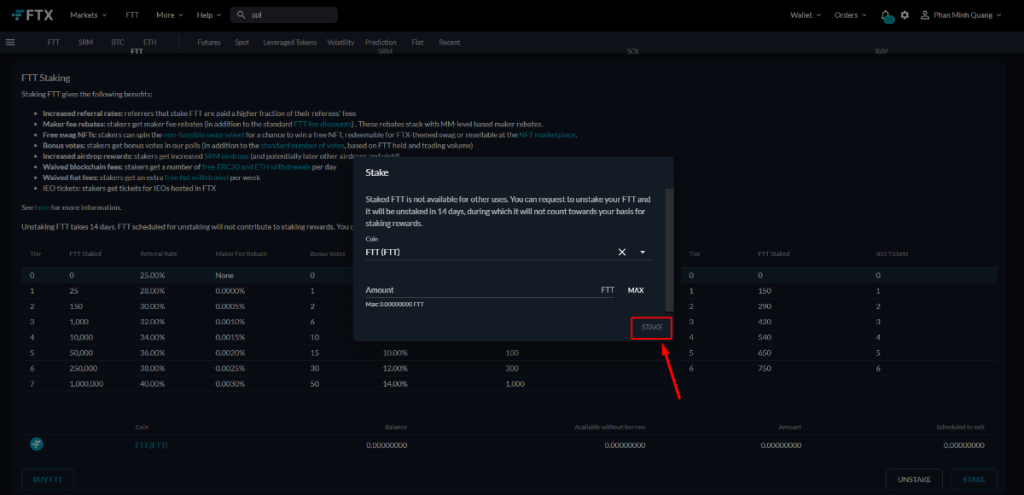
How to list NFT on FTX
Minting or listing NFT is currently only available on FTX US. To list an NFT, first, go to the FTX US website here. Log into your account and click on “Create”.
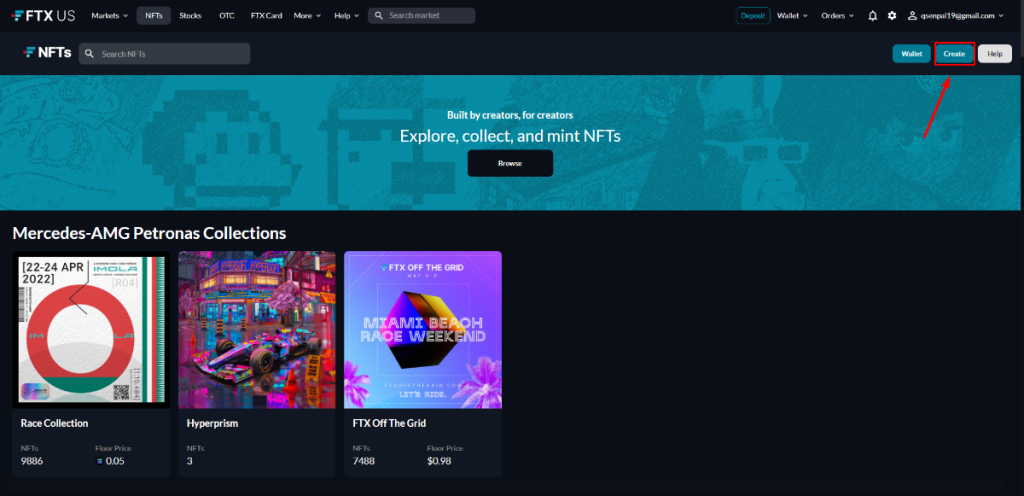
A few options will be given out. Click on “Mint”.
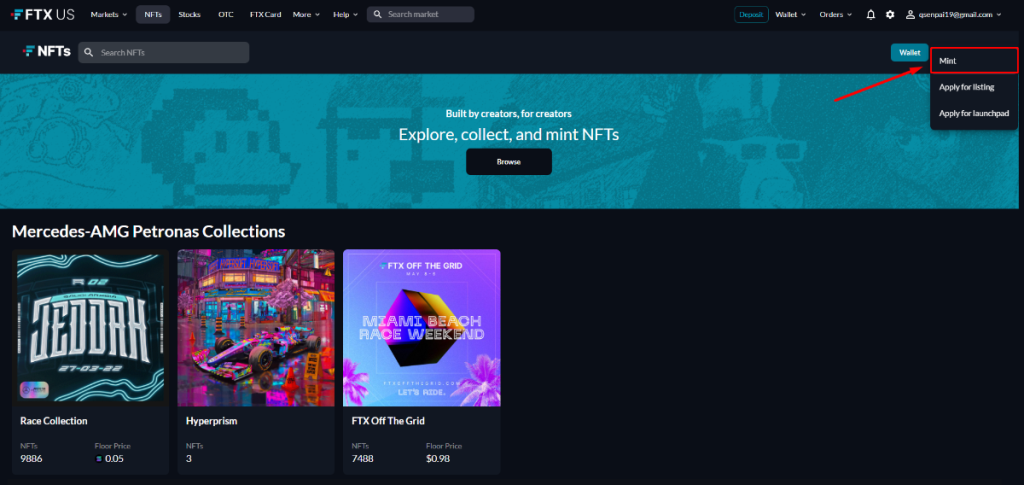
In order to list your NFT, you have to submit a form to FTX US. Some information must be included:
- Issuer: Public name for the creator of the NFT.
- Name: Name for the batch of NFTs this one belongs to, in case you want to list multiple NFTs into 1 collection.
- Quote Currency: The currency that will be used to trade the NFT. FTX US currently supports USD, ETH, and SOL.
- Description: A brief overview of the NFT.
- Attribute (Optional): Some special attributes for this specific NFT. This can help differentiate an NFT from others within its collection.
- Select Image: The picture of the NFT.
After you have filled in all the requirements above, click on “Submit” to list your NFT.
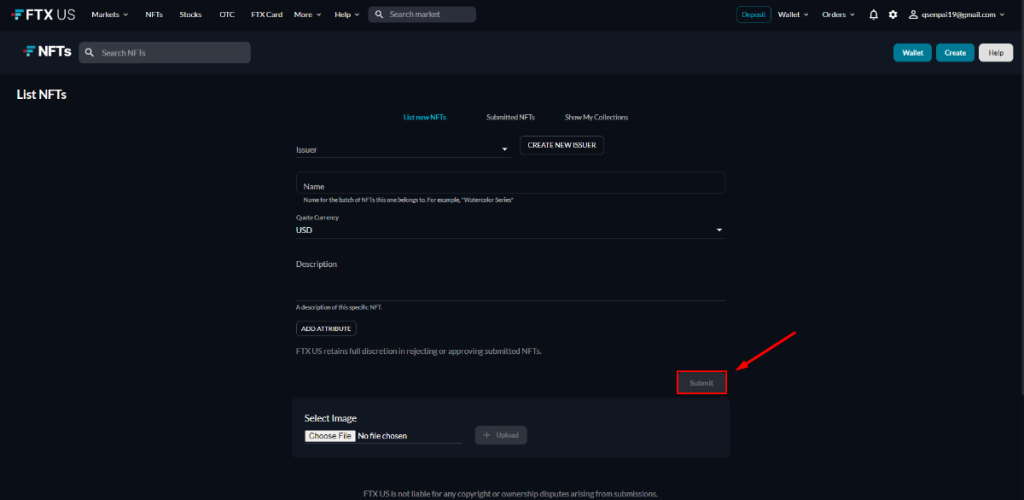
How to get FTX API
On the main page, point to your name on the top right corner and select “API”.
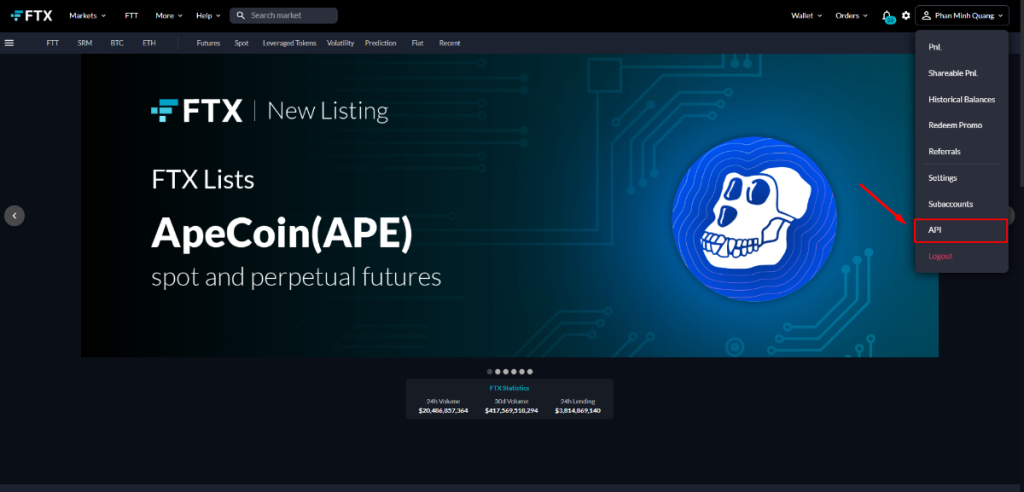
Scroll down, and you will see an option to “Create API Key”. Click on it to get FTX API.
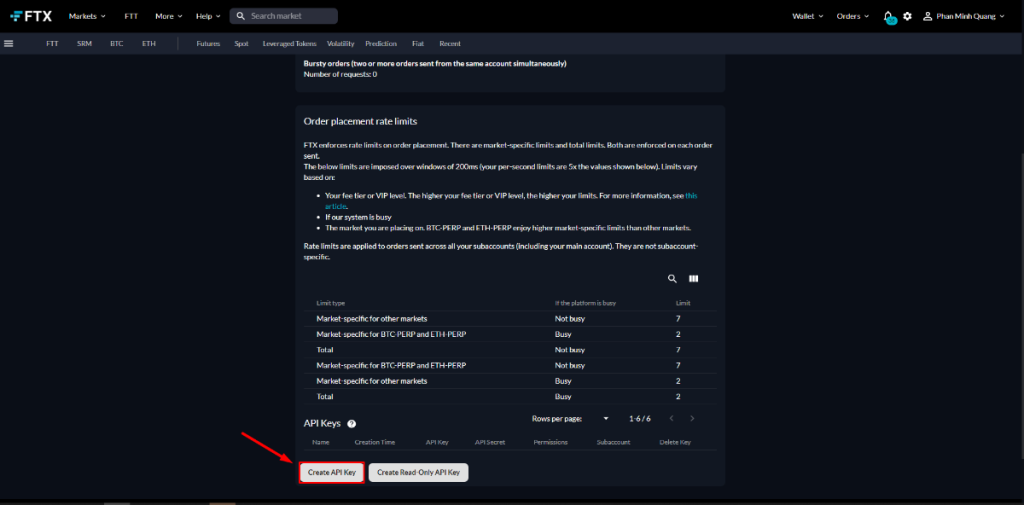
FTX will show you your API Key and API Secret. Remember to write down these lines when you see them, as they will not be shown after you close this dialog. At the same time, do not share these codes with anyone since they can get access to your FTX account.
How to get FTX Referral Code
On the main page, point to your name and click on “Referrals”.
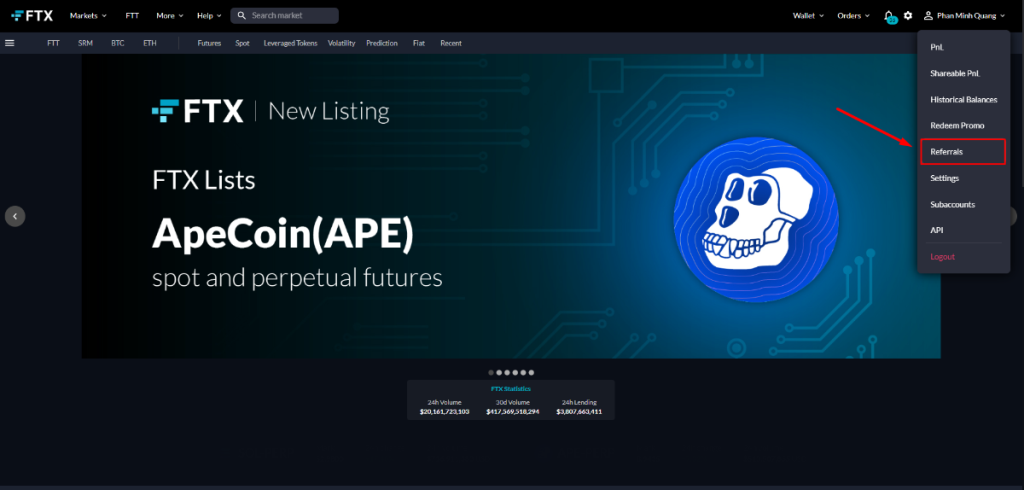
Your referral code will be shown here. You can also create up to 5 custom referral links for your own preference. Click on “Copy” to copy your FTX Referral Code.
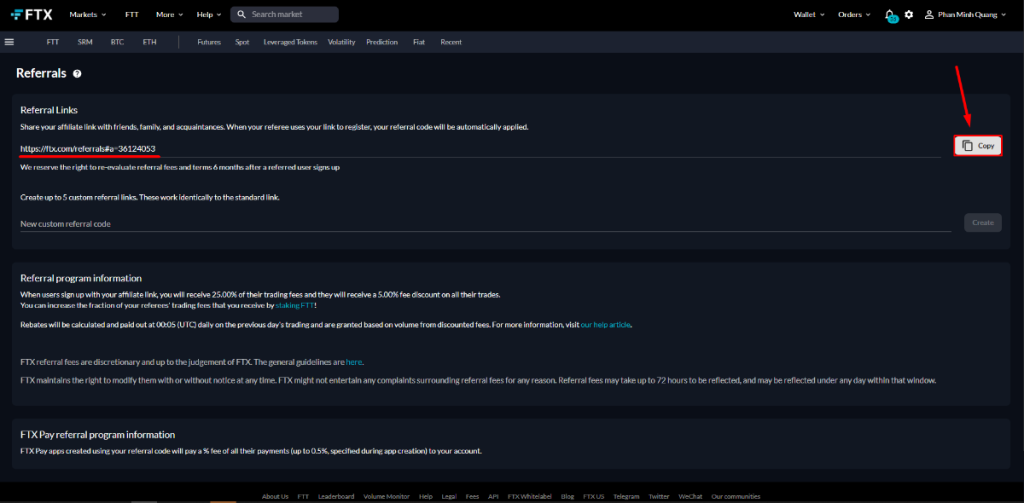
How FTX compares to other exchanges
FTX vs. Coinbase
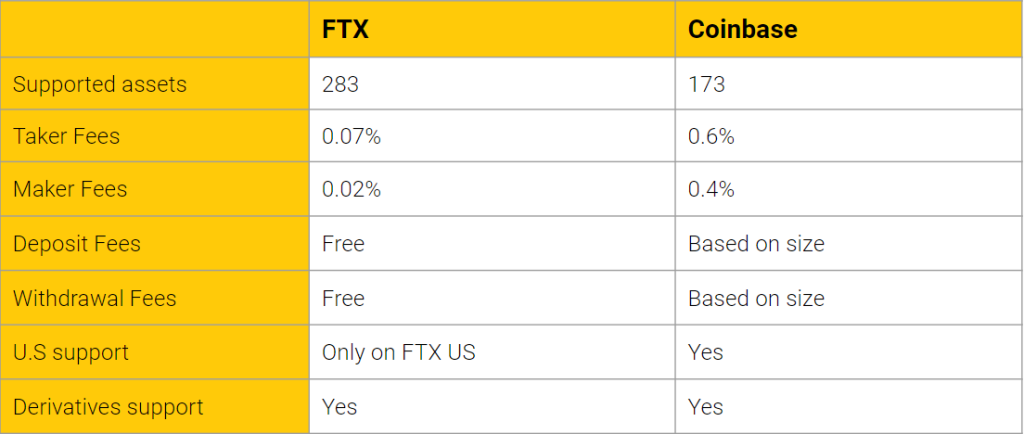
FTX vs. Binance
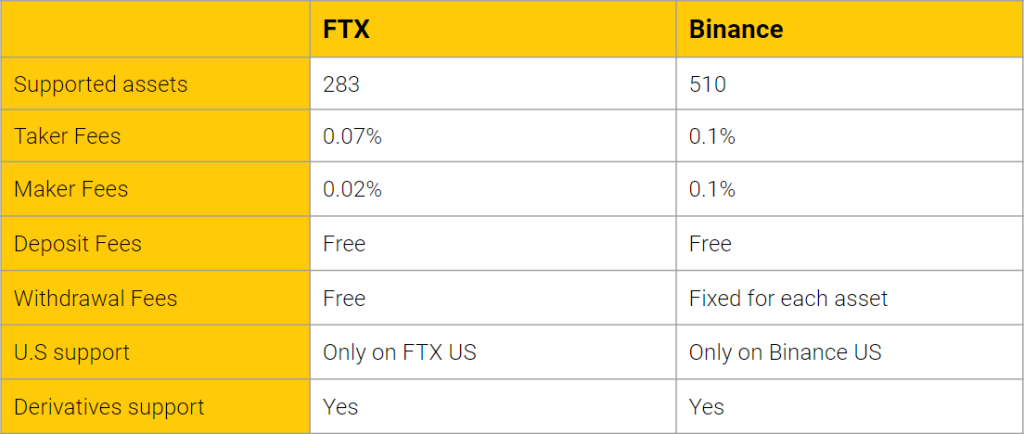
FTX vs. Kraken
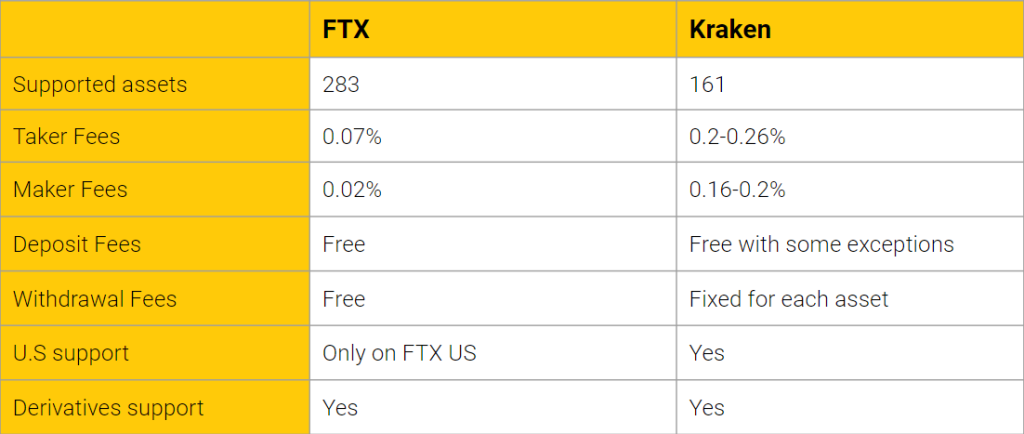
FTX vs. Gemini
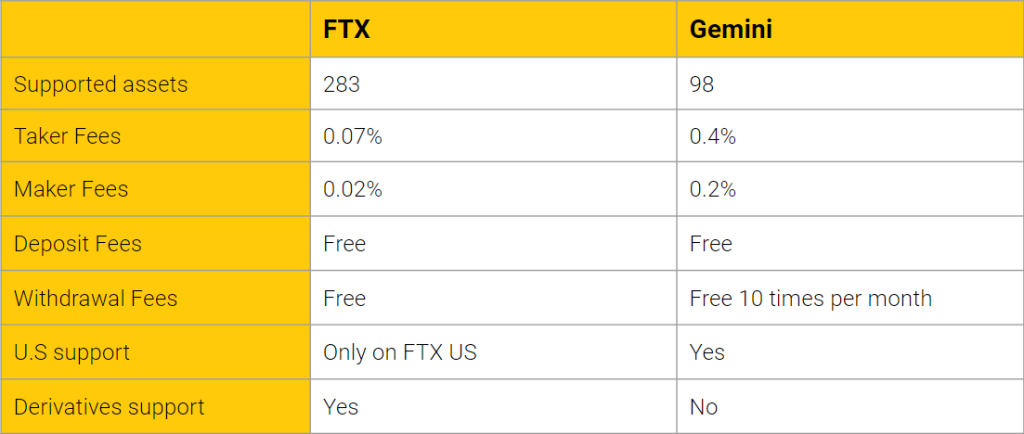
Some questions when using FTX Exchange
What is FTX's token?
FTX’s token is FTT, as mentioned above. You can check out the details of FTT on Coingecko or CoinMarketCap.FTX’s token is FTT, as mentioned above. You can check out the details of FTT on Coingecko or CoinMarketCap.
Learn more: What is CoinMarketCap?
Is FTX safe and legit?
FTX is a reputable centralized exchange that has operated since 2019, and there have not been any hacks or exploits to the exchange. FTX has also been carefully regulated by various parties, which is addressed here.
Is FTX insured?
All users can be insured while using FTX as they have implemented an extremely strict level of security. Your funds are guaranteed to stay safe on FTX.
Is FTX available in the US?
At the moment, due to regulations in the United States, FTX cannot operate in the US. Therefore, US residents do not have access to FTX as well as its native token - FTT.
Nevertheless, FTX has developed a completely new product called FTX US, which is an identical exchange to FTX but can operate in the US. If you are a US citizen, feel free to enjoy FTX features on FTX US.
Does FTX report to IRS?
No, FTX does not report to IRS or provide a tax report.
Conclusion
And that is everything you need to know about FTX. If you have any questions about FTX and how to use this exchange, don't hesitate to leave a comment below. The Coin98 team will answer your questions as soon as possible!





















































































